Special Report
How Every State Is Managing Schools During the Pandemic
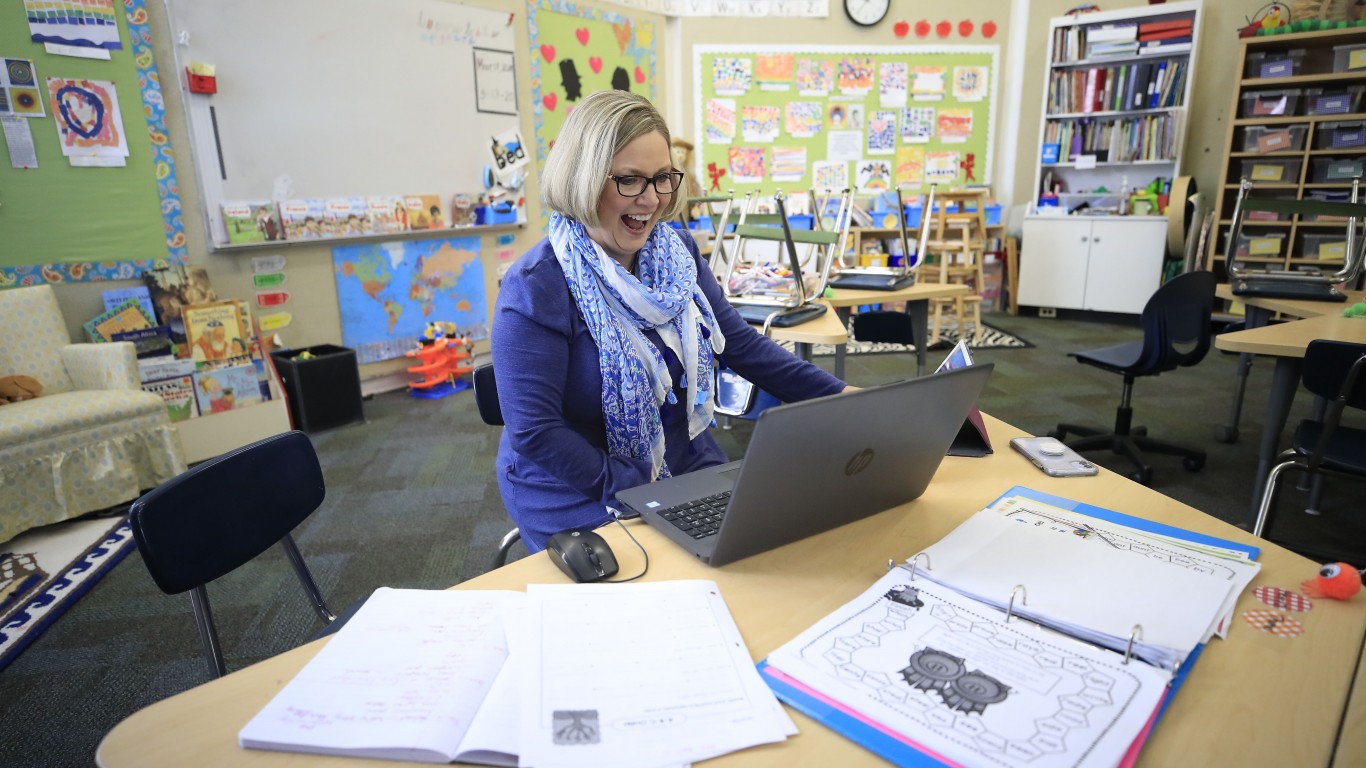
Published:
Last Updated:

As coronavirus cases continue to rise across the U.S. school districts all over the country have developed plans to deal with potential outbreaks in their schools — and the measures school officials take to contain the spread change almost daily.
24/7 Wall St. reviewed guidelines released by state governors and health and education departments as well as news articles to create a current list of school restrictions and re-closures in every state.
Daily temperature checks at the door, mask wearing, and staying socially distant have been the new normal since the first day of the academic year. Students, teachers, and parents alike have by now also became accustomed to sudden closures after someone at the schools tests positive for COVID-19
In an effort to make school closures more predictable, many school districts have established a threshold for the number of confirmed COVID-19 cases per student and staff. That way, parents know if a closure is imminent and can prepare in advance. Some schools have started administering COVID-19 rapid tests as a way to minimize the risk of transmission and remain open.
In a few states, schools don’t have to close and students or staff don’t even have to quarantine if the people who have been exposed to COVID-19 were wearing masks and are not exhibiting any of the disease’s symptoms.
With the coronavirus pandemic still wreaking havoc in nearly every state in the country, switching to remote learning until further notice has increasingly been an option. And with vaccination campaigns underway, teachers in some states have asked that schools close for in-person instruction until staff are able to get the shot.
The second year of the coronavirus pandemic is perhaps more optimistic as millions of people across the country have already been vaccinated. Still, school life may not go back to pre-COVID-19 normalcy soon — here are 20 major myths about COVID-19.
Click here to see how every state is managing schools during the pandemic
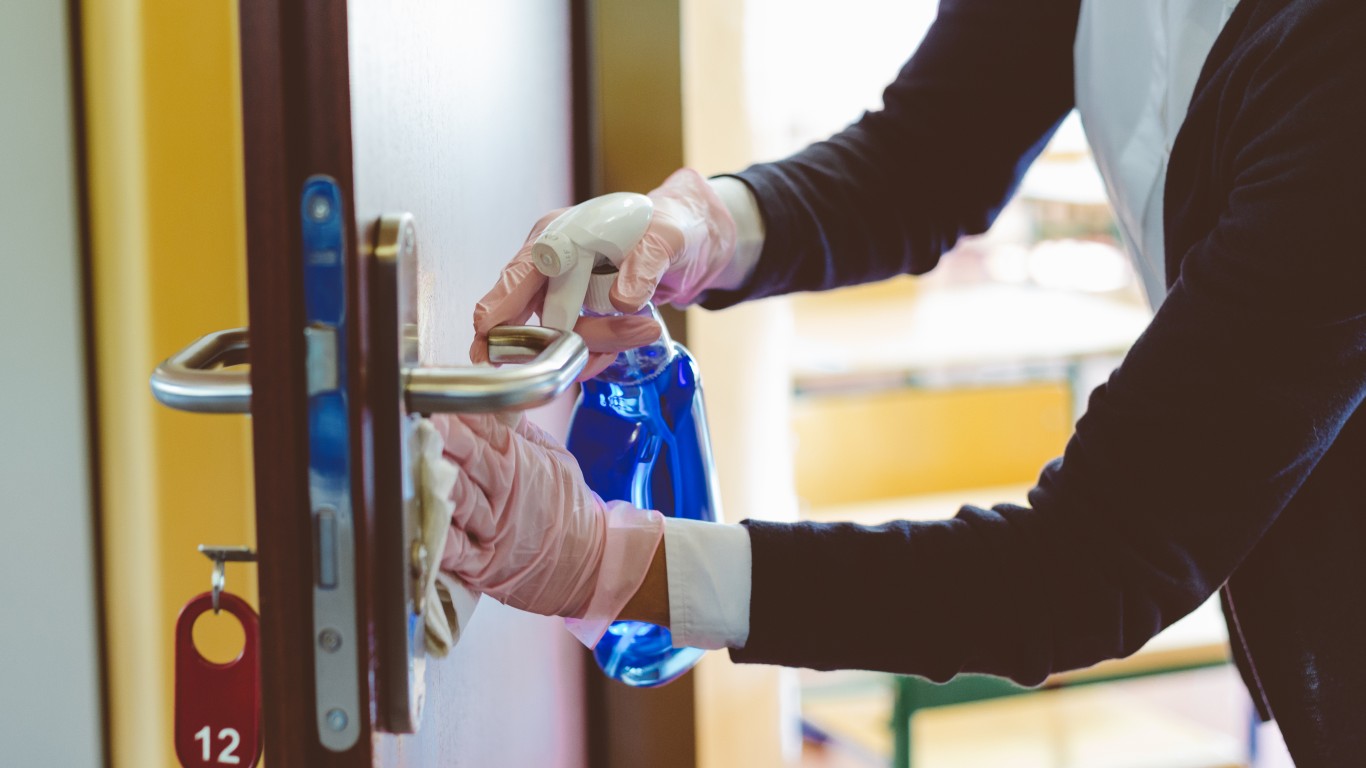
Alabama
> Measures taken: Several counties delayed the start of in-person instruction in the second semester by at least a week. Calhoun County Schools moved online full-time.
> Health screening recommendations: Daily temperature checks
> COVID-19 cases as of Jan 20: 8,790 per 100,000 people — 15th highest (total: 429,655)
> Change avg. daily cases, Jan 12 – Jan 19: 4.6% — 21st smallest increase (from 407,848 to 426,543)
> Population: 4.9 million
[in-text-ad]
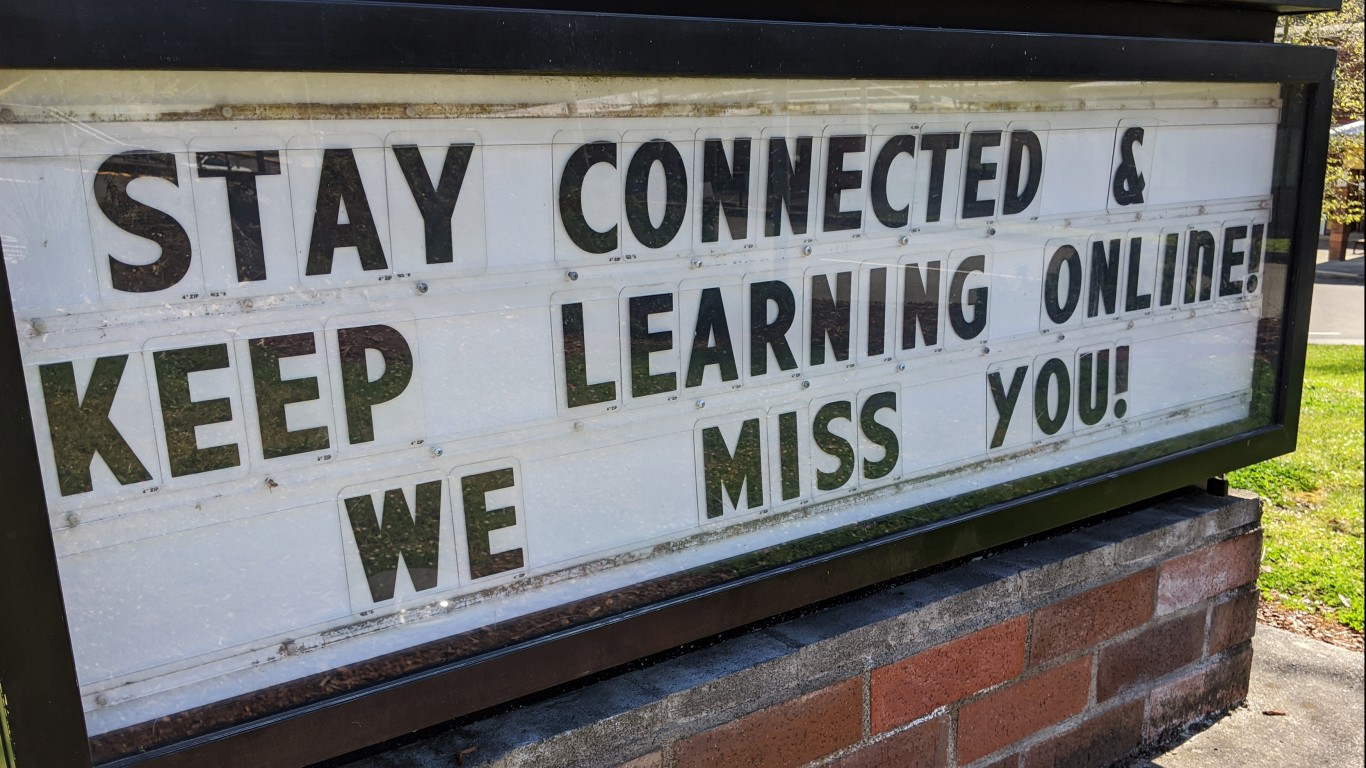
Alaska
> Measures taken: Anchorage School District delayed plans for in-person instruction until Jan 19. Some teachers ask for delays until they get vaccinated.
> Health screening recommendations: Daily temperature and symptom screening for all
> COVID-19 cases as of Jan 20: 7,105 per 100,000 people — 18th lowest (total: 52,393)
> Change avg. daily cases, Jan 12 – Jan 19: 3.6% — 11th smallest increase (from 50,394 to 52,222)
> Population: 737,000
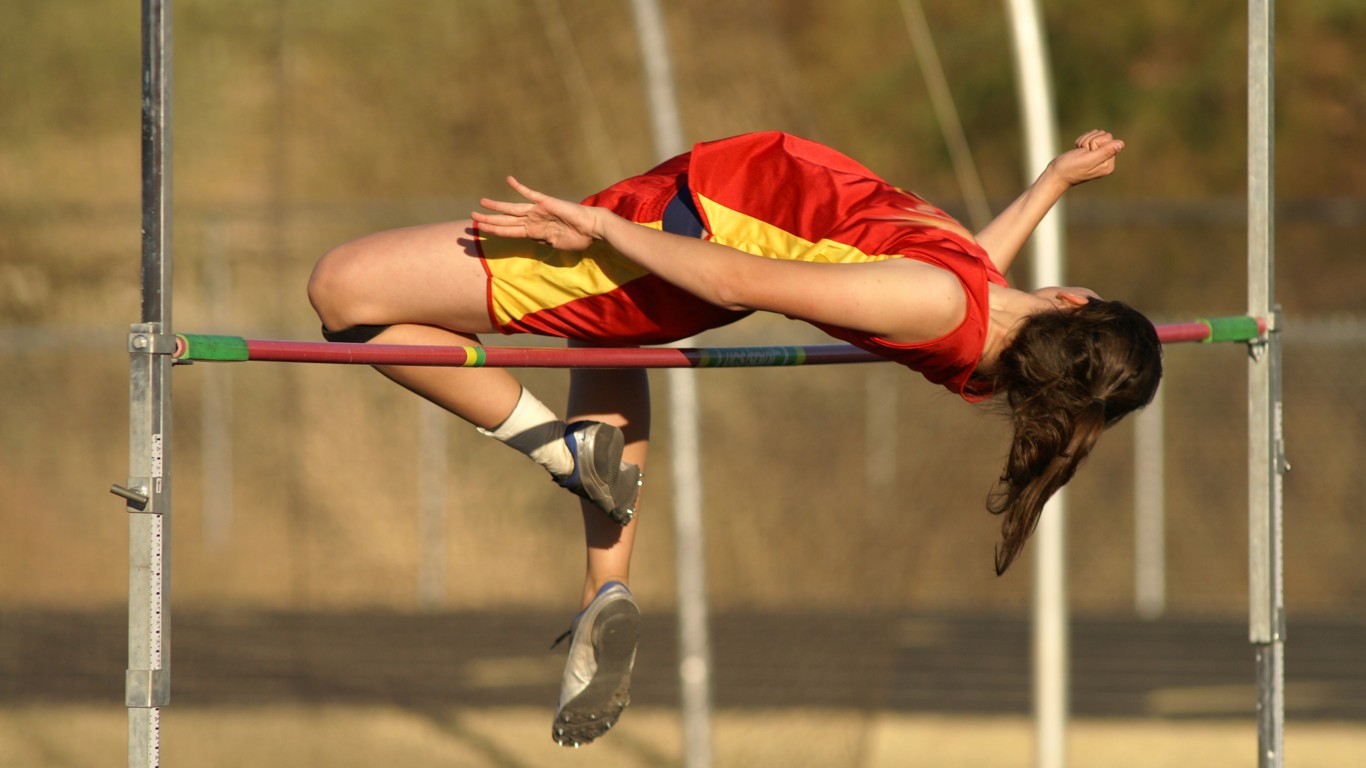
Arizona
> Measures taken: The largest public school district in Arizona moved to remote learning. Teachers in the Peoria Unified School District staged a sickout protesting in-person learning as COVID-19 cases kept rising.
> Health screening recommendations: Daily symptom screening and temperature checks
> COVID-19 cases as of Jan 20: 9,629 per 100,000 people — 7th highest (total: 690,544)
> Change avg. daily cases, Jan 12 – Jan 19: 7.8% — 8th largest increase (from 636,100 to 685,699)
> Population: 7.2 million
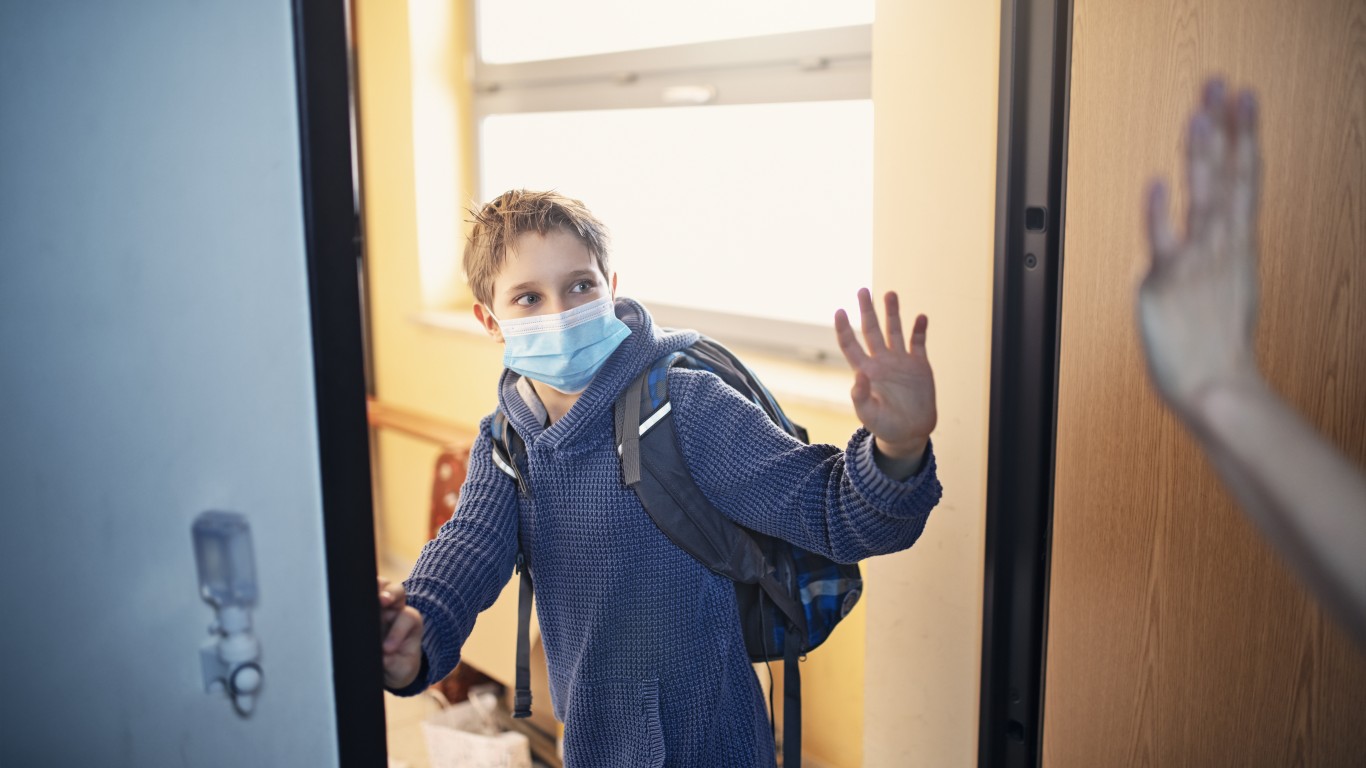
Arkansas
> Measures taken: More than 100 schools are in communities with high COVID-19 spread. Dozens have moved to remote learning. At least one school in Earle School District went remote indefinitely.
> Health screening recommendations: To have screening stations and screening signs
> COVID-19 cases as of Jan 20: 9,162 per 100,000 people — 9th highest (total: 276,114)
> Change avg. daily cases, Jan 12 – Jan 19: 5.4% — 24th smallest increase (from 259,553 to 273,594)
> Population: 3.0 million
[in-text-ad-2]
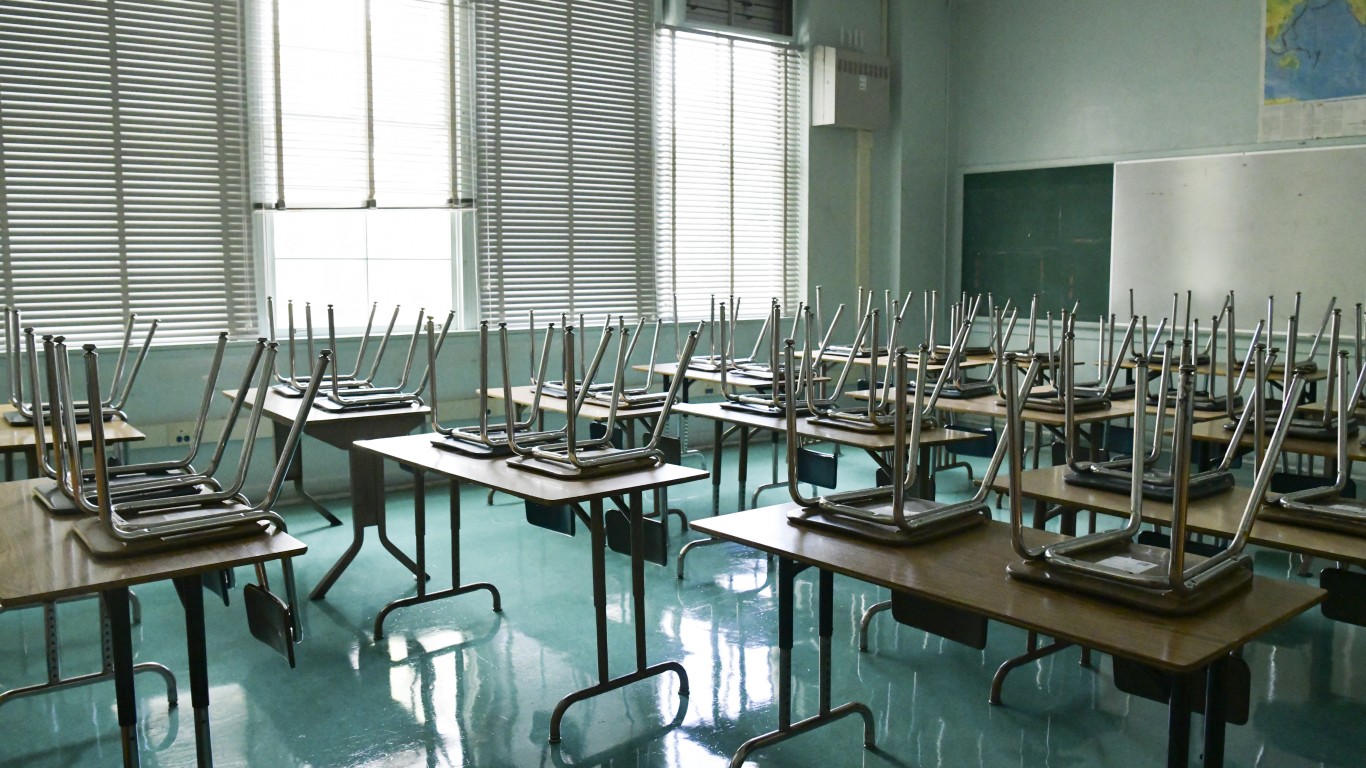
California
> Measures taken: Almost all K-12 students are in the purple “widespread” tier and can’t begin offering in-person instruction. Schools are required to close when 5% of staff and students test positive for COVID-19 within a 14-day period. 1 in 3 students were testing positive at some L.A. schools as of Jan 7.
> Health screening recommendations: Daily symptom screening and temperature checks, hand-washing required before entering school
> COVID-19 cases as of Jan 20: 7,633 per 100,000 people — 25th highest (total: 3,019,371)
> Change avg. daily cases, Jan 12 – Jan 19: 9.1% — 6th largest increase (from 2,747,288 to 2,996,968)
> Population: 39.6 million
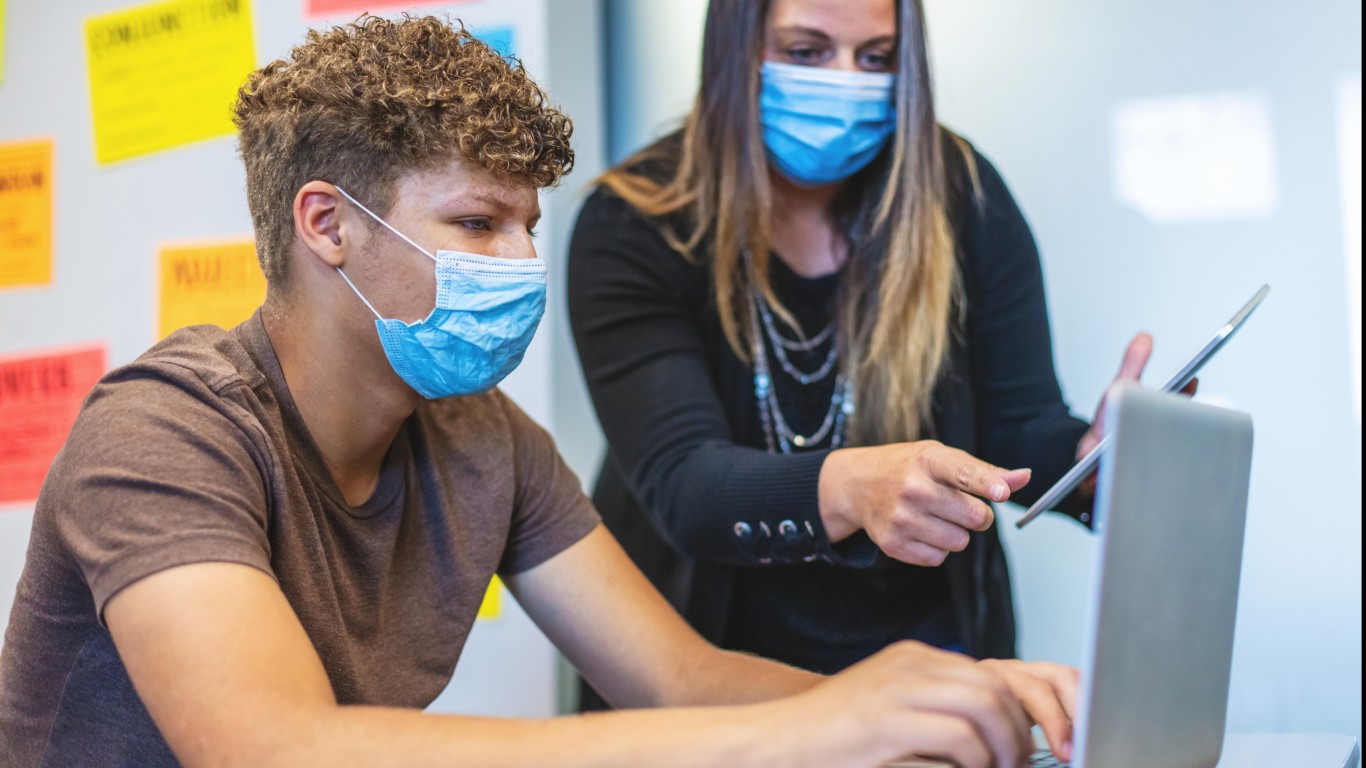
Colorado
> Measures taken: Many of the biggest school districts in Colorado are fully remote. Public schools in Denver started the spring semester remotely, planning to phase kids back into classrooms by Feb 1.
> Health screening recommendations: At-home or on-site symptom screening and temperature checks
> COVID-19 cases as of Jan 20: 6,634 per 100,000 people — 15th lowest (total: 377,856)
> Change avg. daily cases, Jan 12 – Jan 19: 3.7% — 12th smallest increase (from 362,825 to 376,171)
> Population: 5.7 million
[in-text-ad]
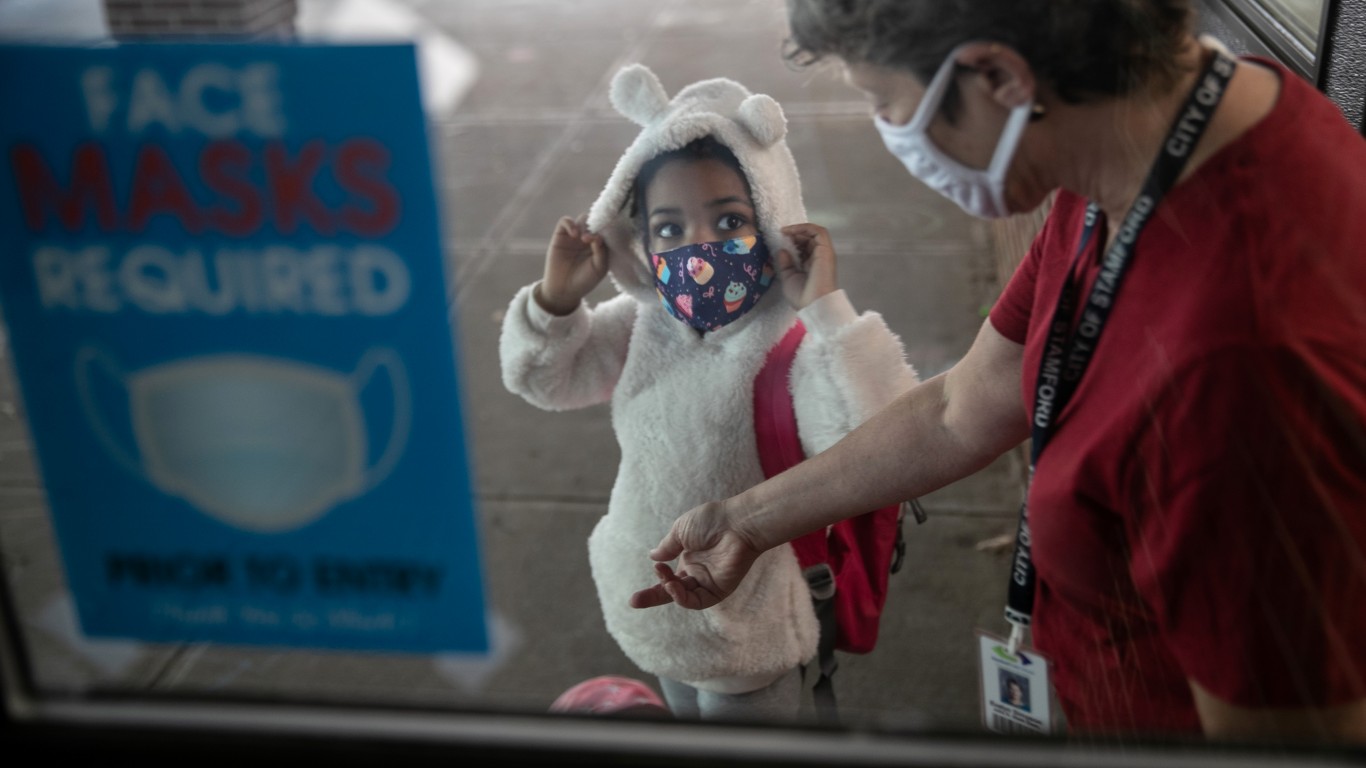
Connecticut
> Measures taken: Schools are advised to close if they are in an area with an average of 25+ new cases per 100K residents in a week.
> Health screening recommendations: To maximize social distancing and for students to bring their own water
> COVID-19 cases as of Jan 20: 6,553 per 100,000 people — 13th lowest (total: 234,134)
> Change avg. daily cases, Jan 12 – Jan 19: 7.0% — 15th largest increase (from 217,047 to 232,219)
> Population: 3.6 million
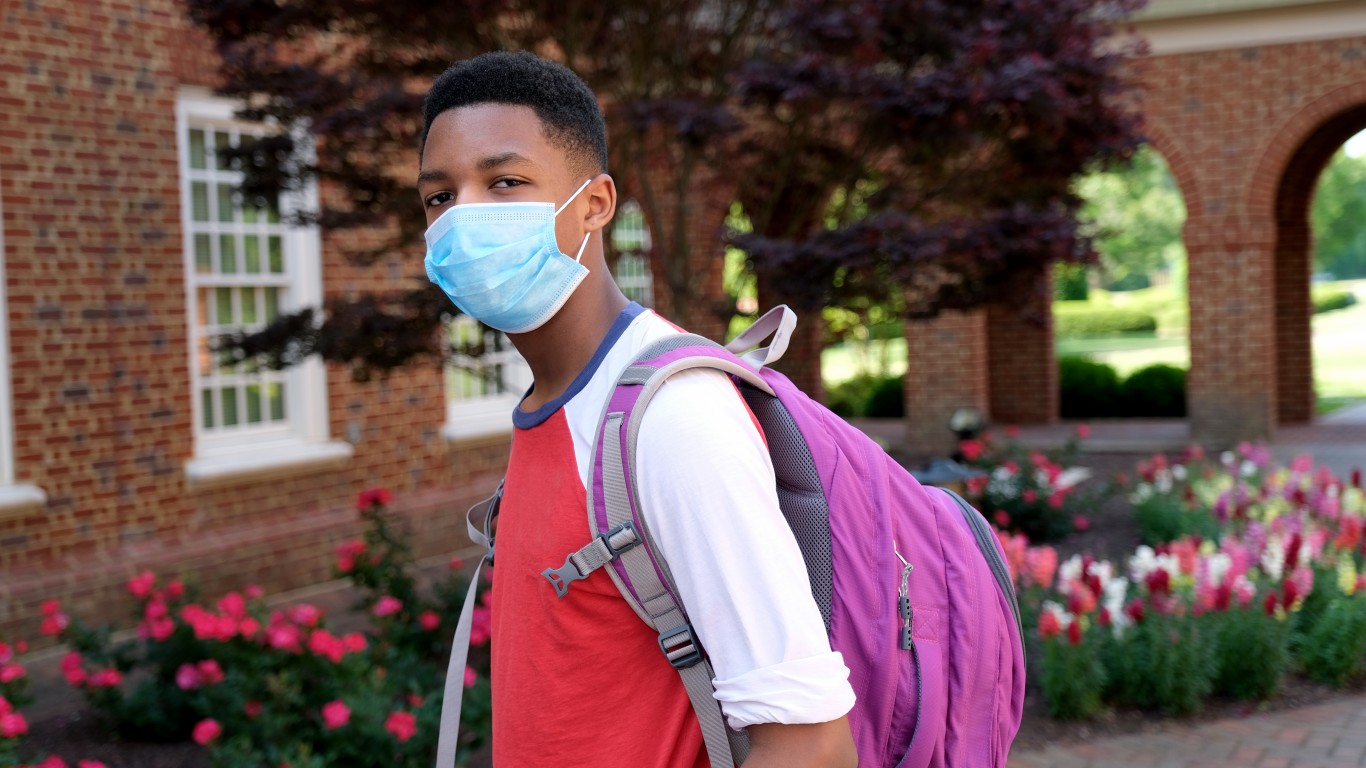
Delaware
> Measures taken: Hybrid learning returned on Jan. 11. Sports competitions have been canceled.
> Health screening recommendations: Daily symptom screening and temperature checks at home. The state will provide testing for staff and students
> COVID-19 cases as of Jan 20: 7,421 per 100,000 people — 22nd lowest (total: 71,775)
> Change avg. daily cases, Jan 12 – Jan 19: 7.3% — 12th largest increase (from 66,446 to 71,311)
> Population: 967,000
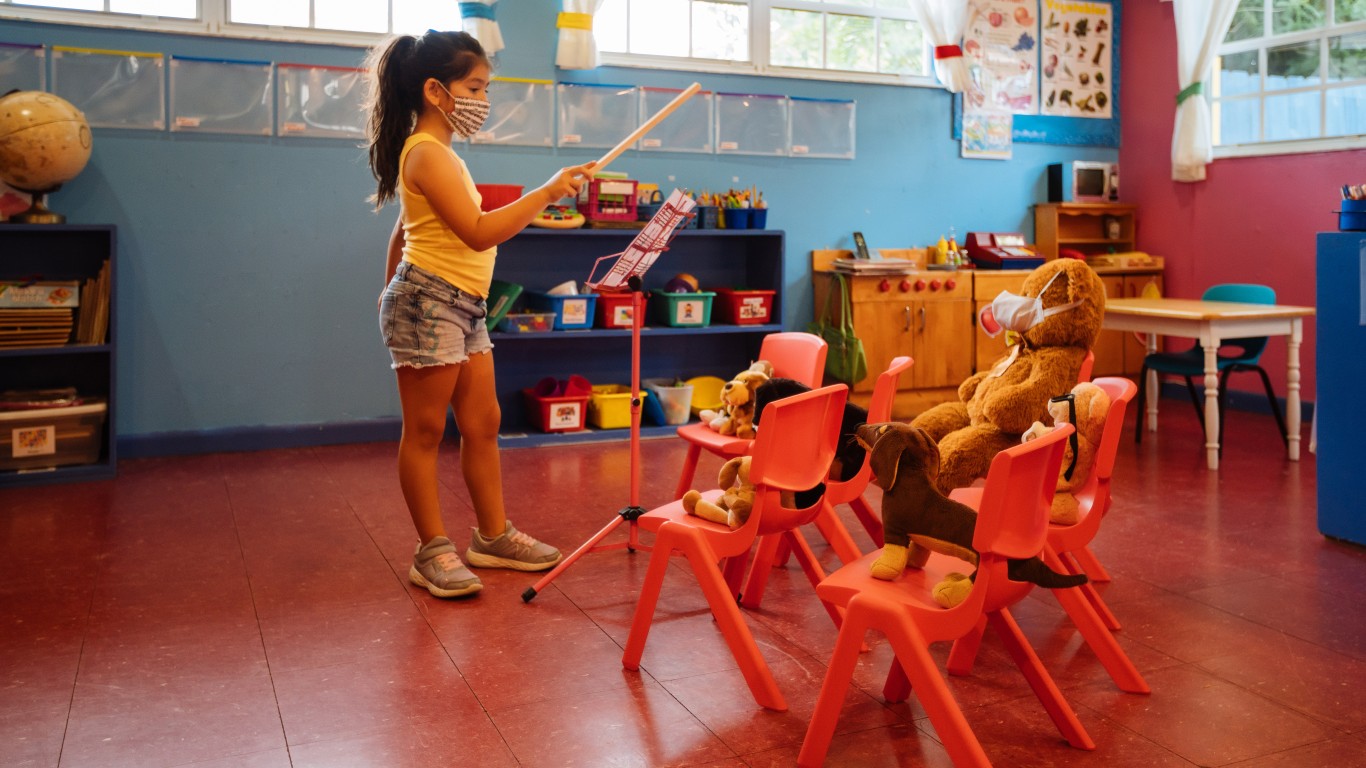
Florida
> Measures taken: An executive order has been issued extending remote and hybrid learning options.
> Health screening recommendations: To set up secondary clinic for kids showing symptoms
> COVID-19 cases as of Jan 20: 7,517 per 100,000 people — 24th lowest (total: 1,601,011)
> Change avg. daily cases, Jan 12 – Jan 19: 5.7% — 22nd largest increase (from 1,503,482 to 1,589,097)
> Population: 21.3 million
[in-text-ad-2]
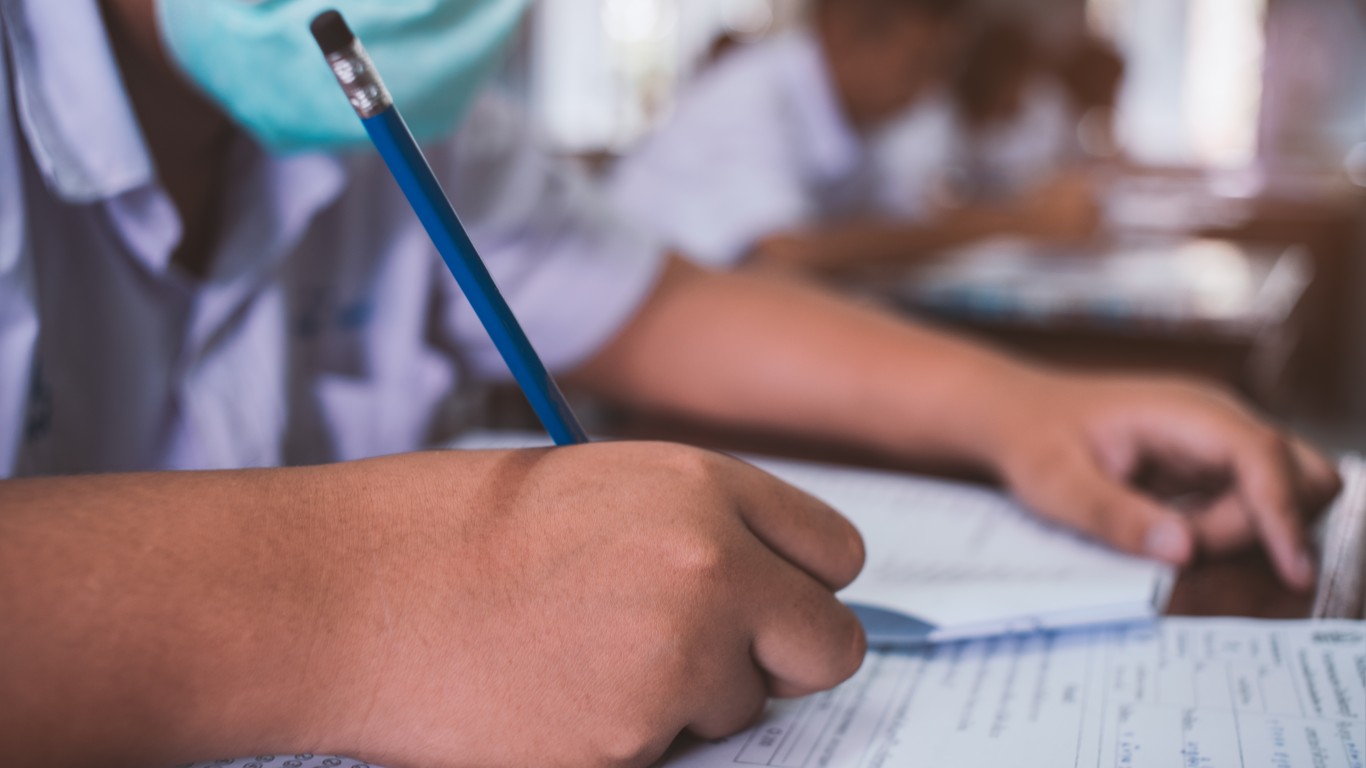
Georgia
> Measures taken: Long County School System and Ware County Schools delayed reopening their schools for in-person instruction until Jan 11.
> Health screening recommendations: Daily temperature checks for all
> COVID-19 cases as of Jan 20: 6,611 per 100,000 people — 14th lowest (total: 695,400)
> Change avg. daily cases, Jan 12 – Jan 19: 6.3% — 17th largest increase (from 648,694 to 689,676)
> Population: 10.5 million
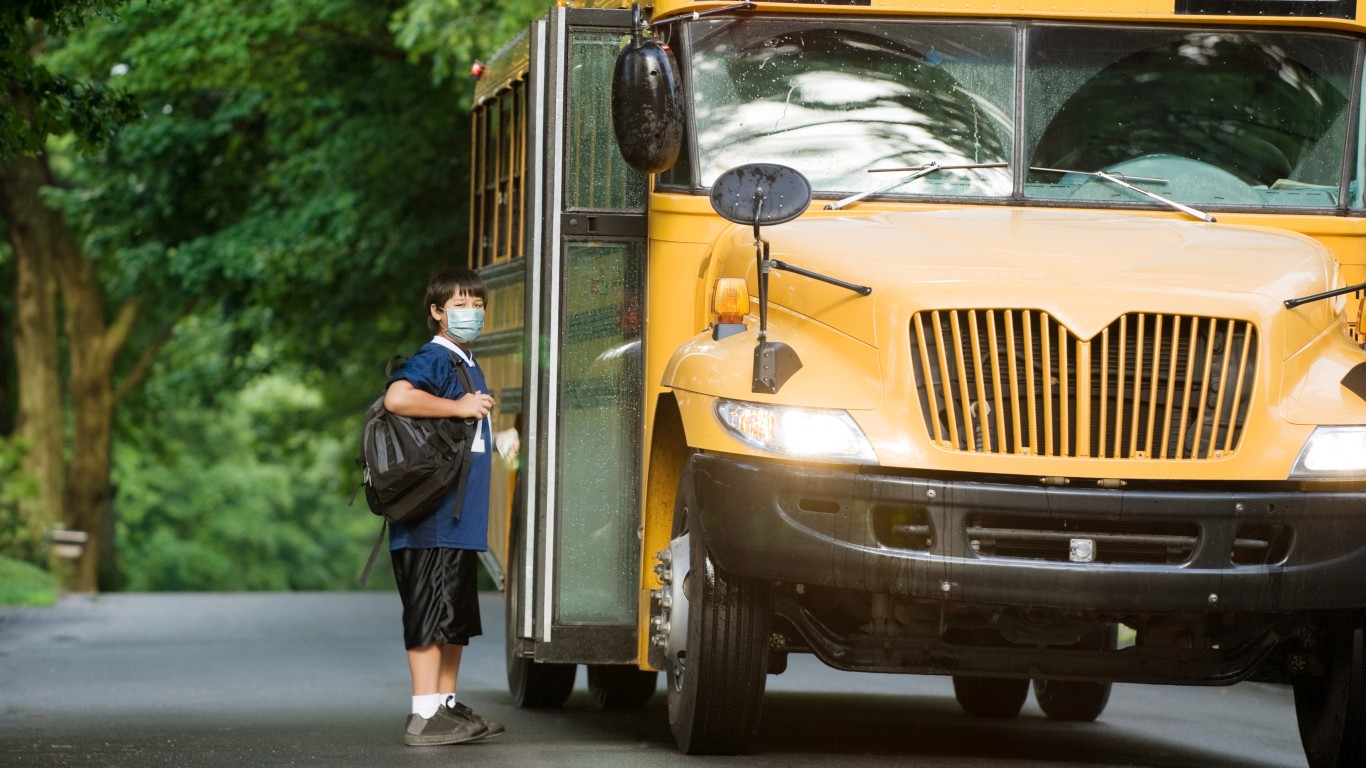
Hawaii
> Measures taken: Some schools are extending the first phase of reopening for in-person instruction, which consists of half-day classes for vulnerable students.
> Health screening recommendations: Daily symptom screenings
> COVID-19 cases as of Jan 20: 1,733 per 100,000 people — 2nd lowest (total: 24,620)
> Change avg. daily cases, Jan 12 – Jan 19: 3.9% — 14th smallest increase (from 23,627 to 24,546)
> Population: 1.4 million
[in-text-ad]

Idaho
> Measures taken: All schools in Boise School District went fully remote until mid-January. The Emmett School District now requires all students and staff to wear masks.
> Health screening recommendations: Daily symptom screening and temperature checks for all
> COVID-19 cases as of Jan 20: 8,937 per 100,000 people — 14th highest (total: 156,778)
> Change avg. daily cases, Jan 12 – Jan 19: 4.4% — 16th smallest increase (from 150,239 to 156,778)
> Population: 1.8 million
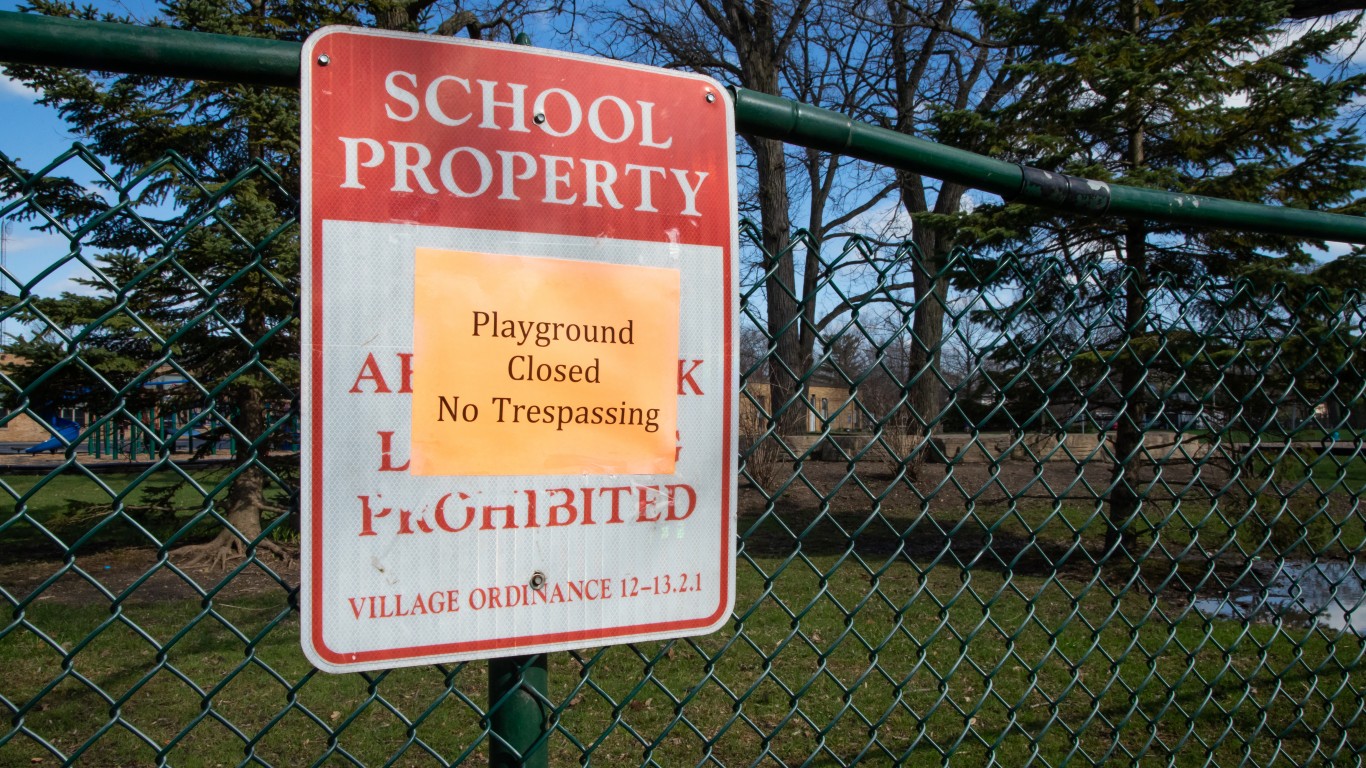
Illinois
> Measures taken: Chicago Public Schools returned to in-person learning on Jan 11, but high school students continue remote. Catholic schools now have the option to transition to remote learning.
> Health screening recommendations: Daily symptom screenings and temperature checks for all
> COVID-19 cases as of Jan 20: 8,487 per 100,000 people — 20th highest (total: 1,081,354)
> Change avg. daily cases, Jan 12 – Jan 19: 3.5% — 10th smallest increase (from 1,040,168 to 1,076,532)
> Population: 12.7 million
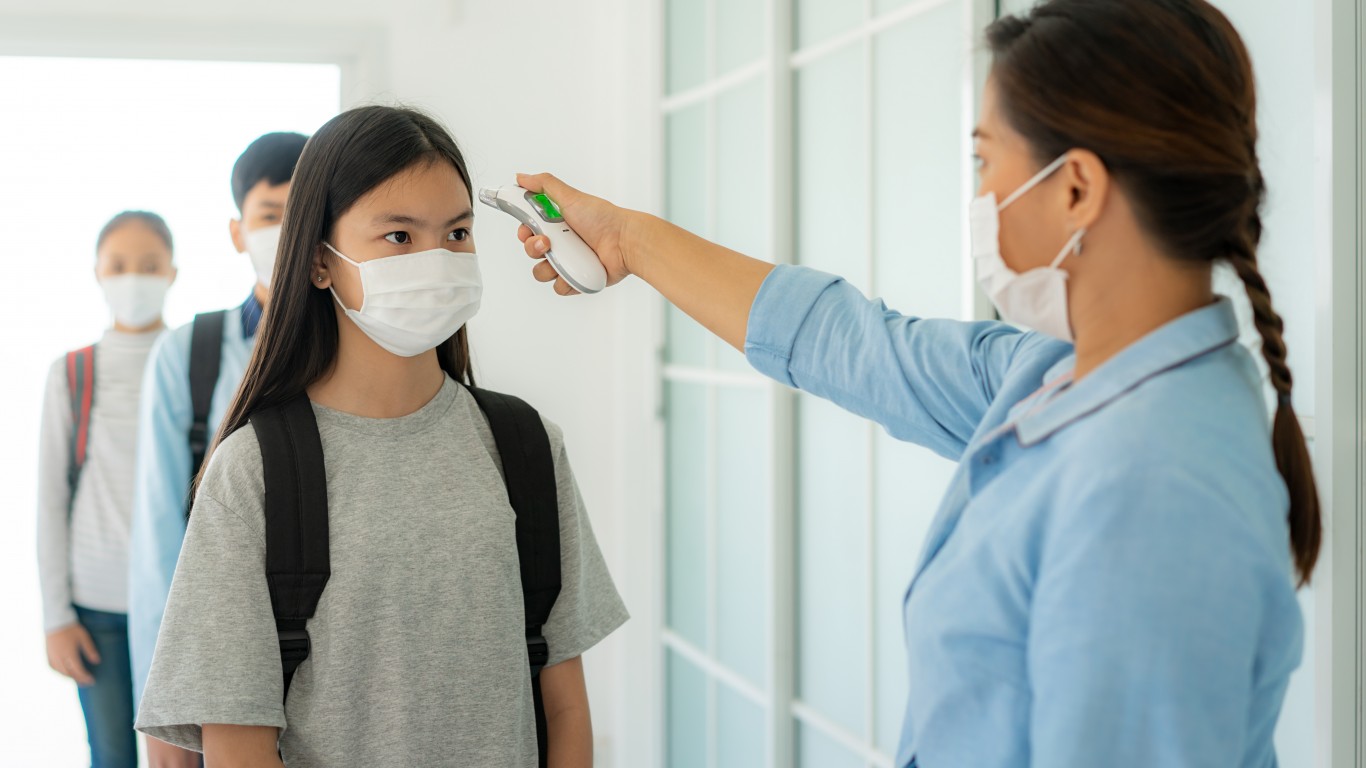
Indiana
> Measures taken: About half of school districts in Indiana have moved to full-time virtual learning for various periods of time.
> Health screening recommendations: Daily temperature checks
> COVID-19 cases as of Jan 20: 8,941 per 100,000 people — 13th highest (total: 598,313)
> Change avg. daily cases, Jan 12 – Jan 19: 4.4% — 17th smallest increase (from 570,477 to 595,436)
> Population: 6.7 million
[in-text-ad-2]
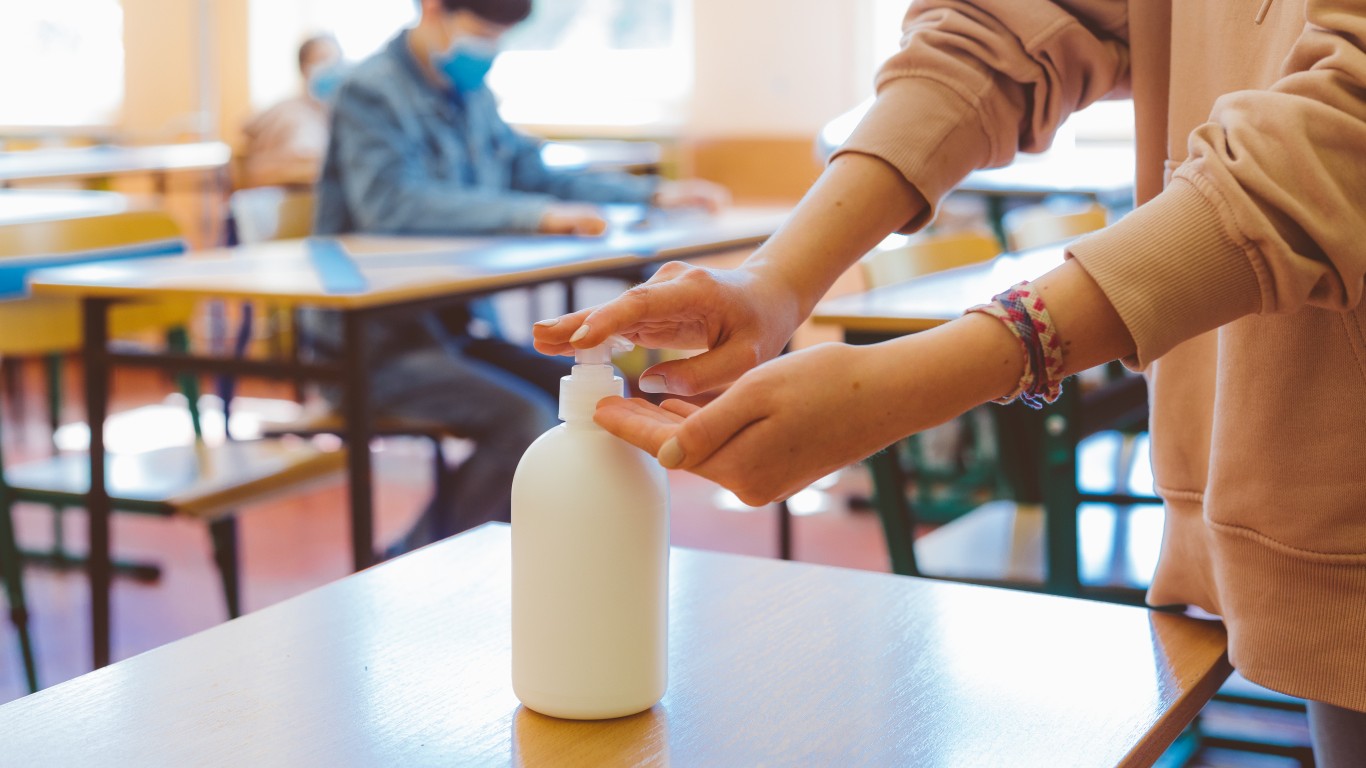
Iowa
> Measures taken: Dozens of counties have a 14-day rolling average positivity rate at or above 15%, which is the threshold that must be met before school districts can request to go to online-only learning.
> Health screening recommendations: Each school to come up with its own safety measures
> COVID-19 cases as of Jan 20: 9,745 per 100,000 people — 6th highest (total: 307,568)
> Change avg. daily cases, Jan 12 – Jan 19: 3.2% — 8th smallest increase (from 296,866 to 306,233)
> Population: 3.2 million
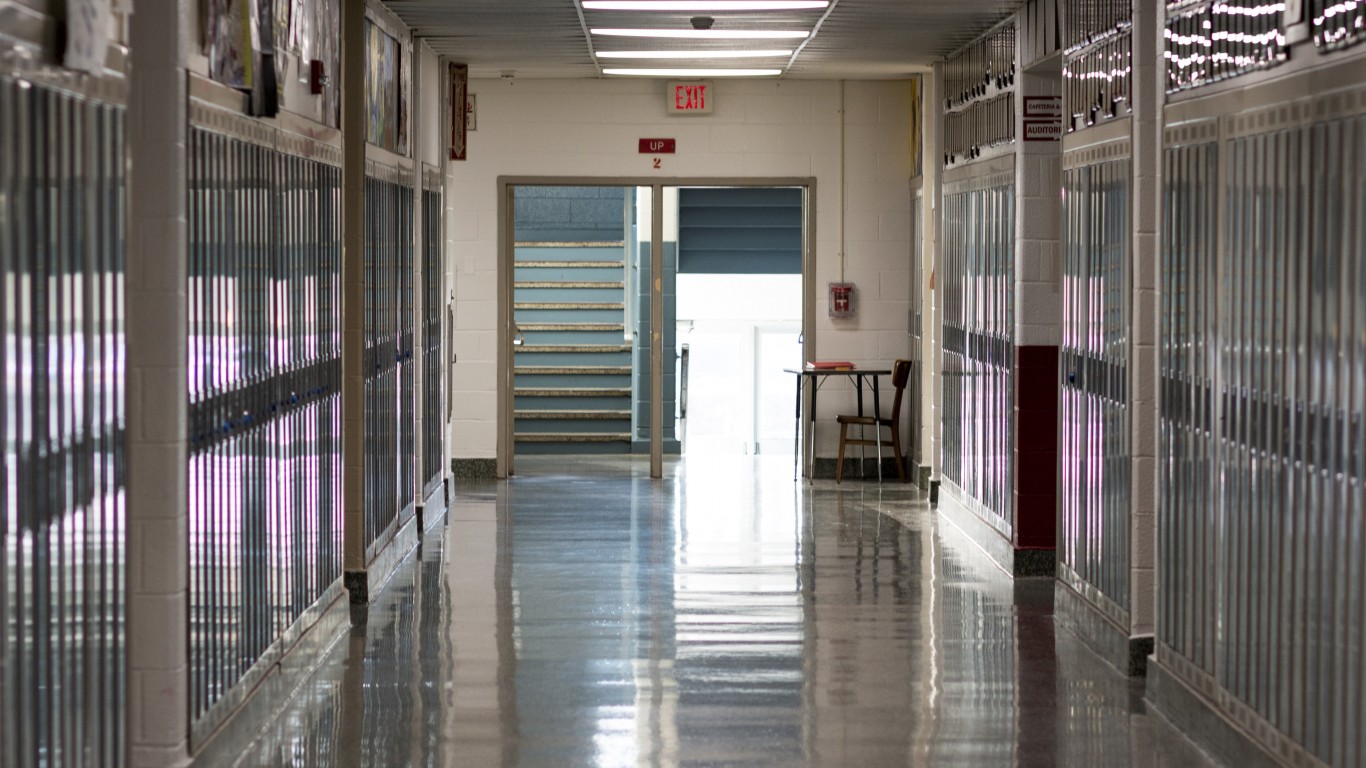
Kansas
> Measures taken: Schools in small and big towns have moved classes online full-time. Wichita school district staff accounts for more than half of COVID-19 cases in the district since the start of the school year.
> Health screening recommendations: Daily temperature checks for staff
> COVID-19 cases as of Jan 20: 9,047 per 100,000 people — 11th highest (total: 263,412)
> Change avg. daily cases, Jan 12 – Jan 19: 5.0% — 22nd smallest increase (from 247,502 to 259,822)
> Population: 2.9 million
[in-text-ad]
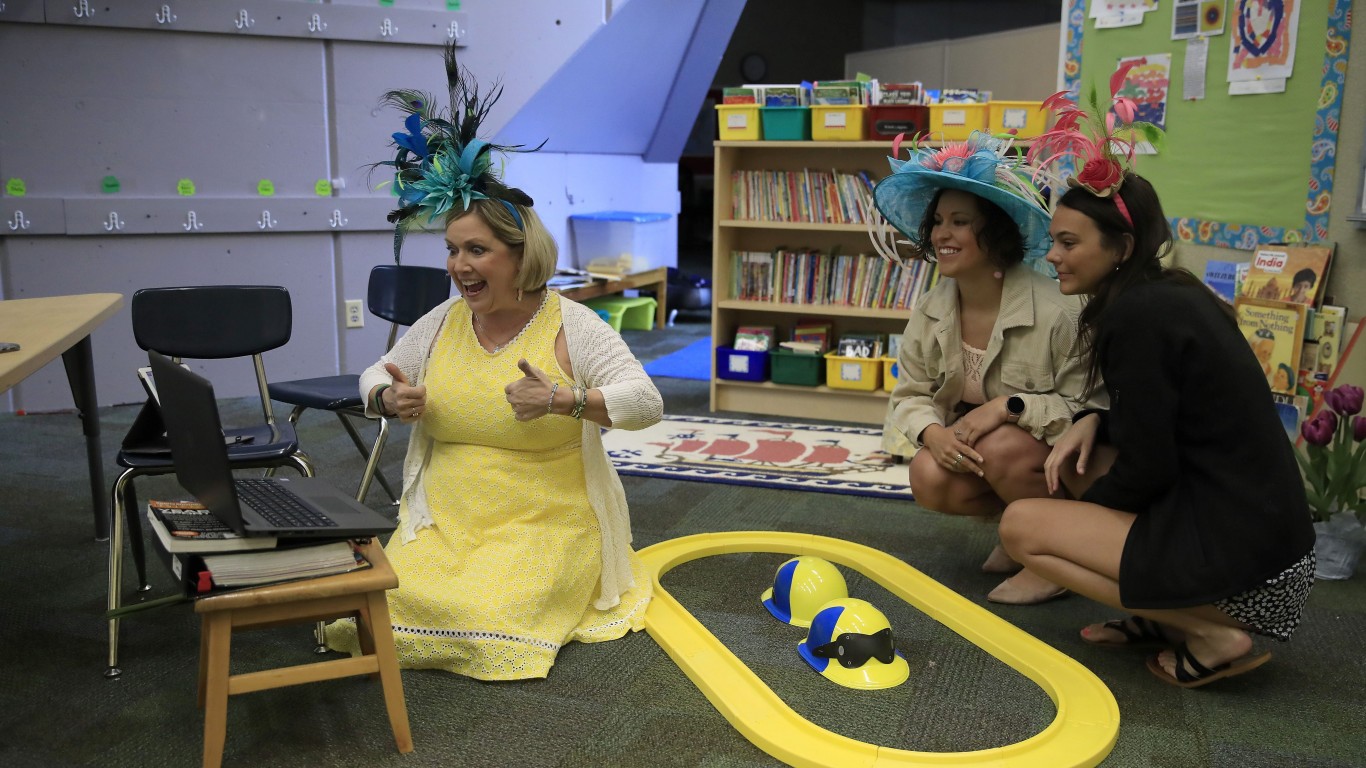
Kentucky
> Measures taken: Middle schools and high schools remained in remote learning until Jan. 4. Perry County moved to online learning, adding makeup days at the end of the academic year.
> Health screening recommendations: Daily temperature checks
> COVID-19 cases as of Jan 20: 7,482 per 100,000 people — 23rd lowest (total: 334,321)
> Change avg. daily cases, Jan 12 – Jan 19: 7.2% — 13th largest increase (from 308,729 to 330,907)
> Population: 4.5 million
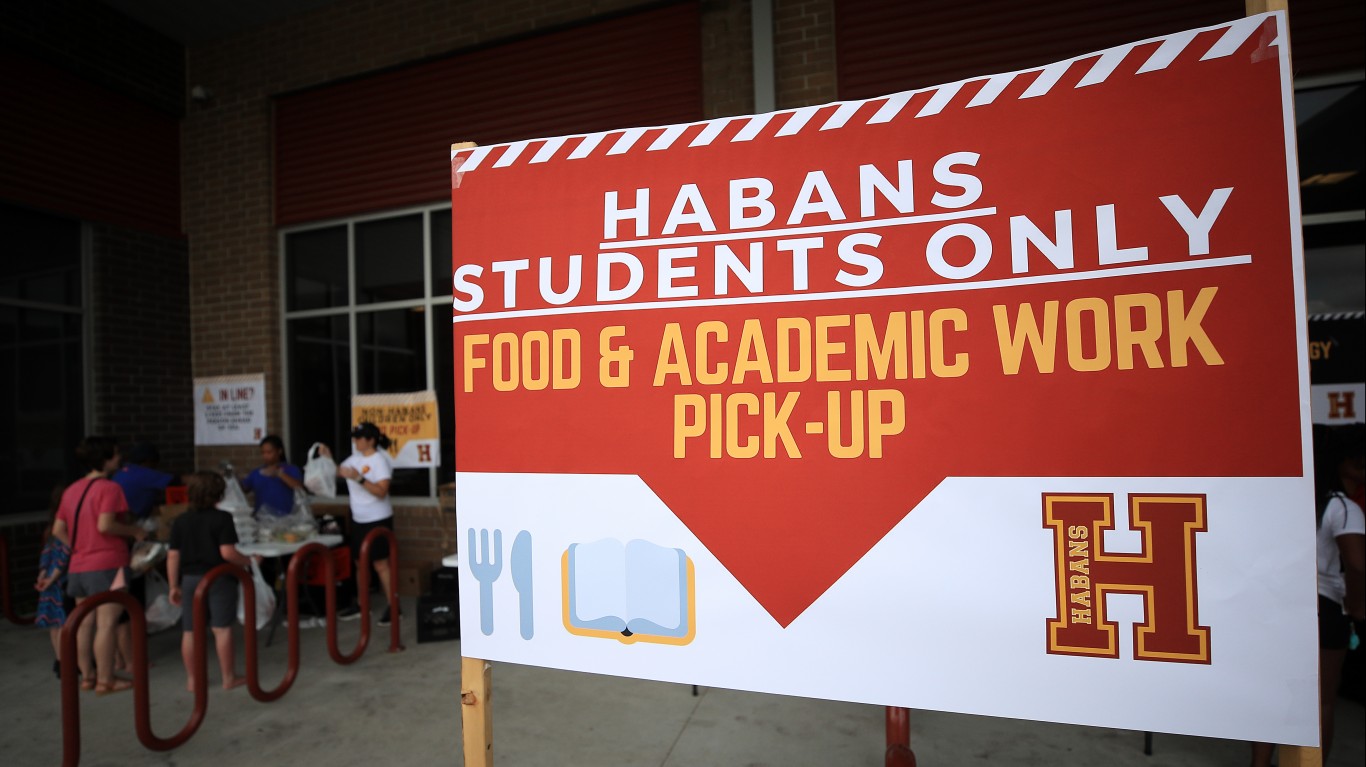
Louisiana
> Measures taken: High school students across the state do in-person COVID-19 testing. New Orleans public schools returned to in-person learning on Jan 4.
> Health screening recommendations: Daily symptom screening and temperature checks
> COVID-19 cases as of Jan 20: 8,038 per 100,000 people — 21st highest (total: 374,582)
> Change avg. daily cases, Jan 12 – Jan 19: 5.4% — 25th smallest increase (from 352,939 to 372,089)
> Population: 4.7 million
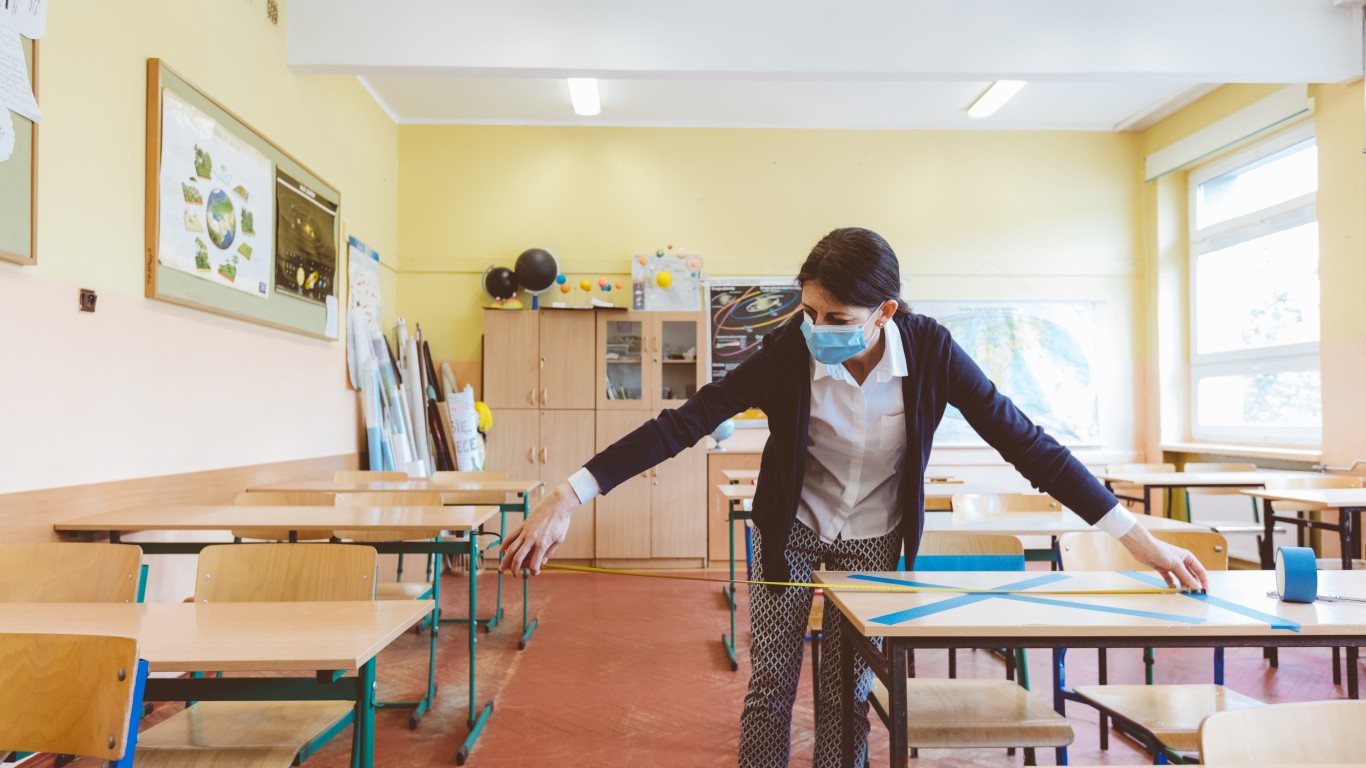
Maine
> Measures taken: Some schools are forced to go fully remote due to staffing shortages. As of Jan 15, 4 counties are in the “yellow” category of transmission, and are advised to suspend extracurricular activities
> Health screening recommendations: Daily self-checks for students and staff
> COVID-19 cases as of Jan 20: 2,612 per 100,000 people — 3rd lowest (total: 34,963)
> Change avg. daily cases, Jan 12 – Jan 19: 13.0% — the largest increase (from 30,326 to 34,262)
> Population: 1.3 million
[in-text-ad-2]
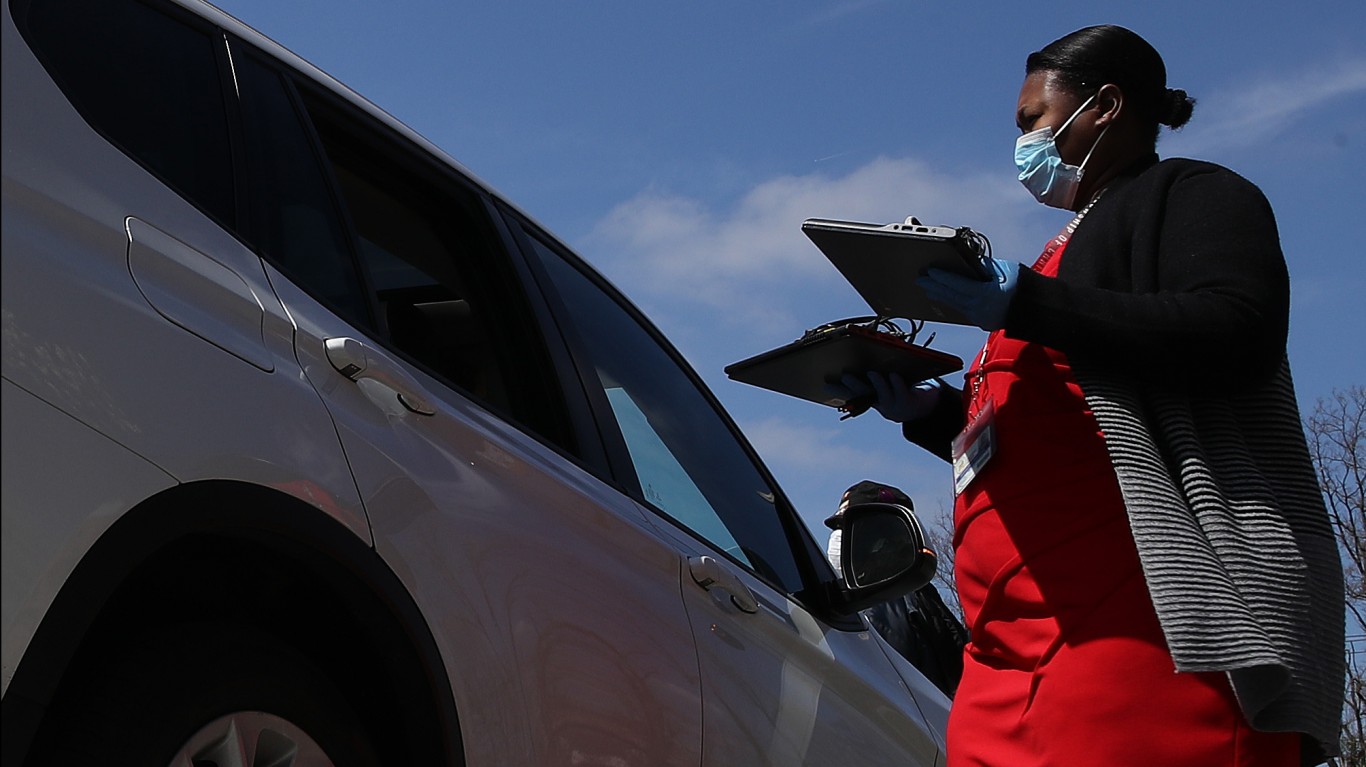
Maryland
> Measures taken: Many schools districts are canceling plans to move to in-person instruction any time soon. Somerset County Public Schools delayed in-person learning a week, until Jan 25.
> Health screening recommendations: Daily temperature checks for staff
> COVID-19 cases as of Jan 20: 5,500 per 100,000 people — 8th lowest (total: 332,353)
> Change avg. daily cases, Jan 12 – Jan 19: 5.7% — 21st largest increase (from 312,351 to 330,186)
> Population: 6.0 million
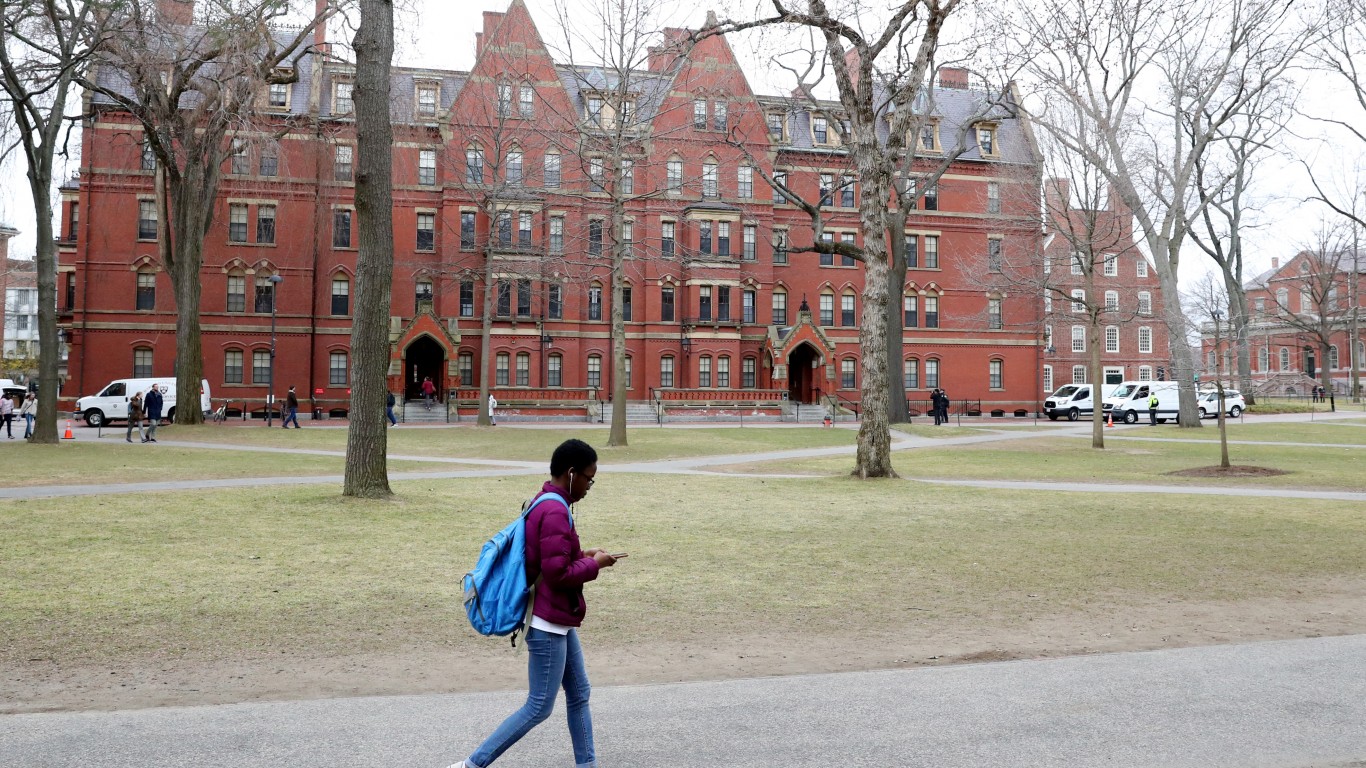
Massachusetts
> Measures taken: In-person instruction in Boston will resume when there are 2 full weeks of falling infection rates. The state started a free rapid COVID-19 testing program.
> Health screening recommendations: Monitoring for symptoms, but temperature checks are not recommended
> COVID-19 cases as of Jan 20: 6,969 per 100,000 people — 17th lowest (total: 481,040)
> Change avg. daily cases, Jan 12 – Jan 19: 7.7% — 9th largest increase (from 442,529 to 476,526)
> Population: 6.9 million
[in-text-ad]
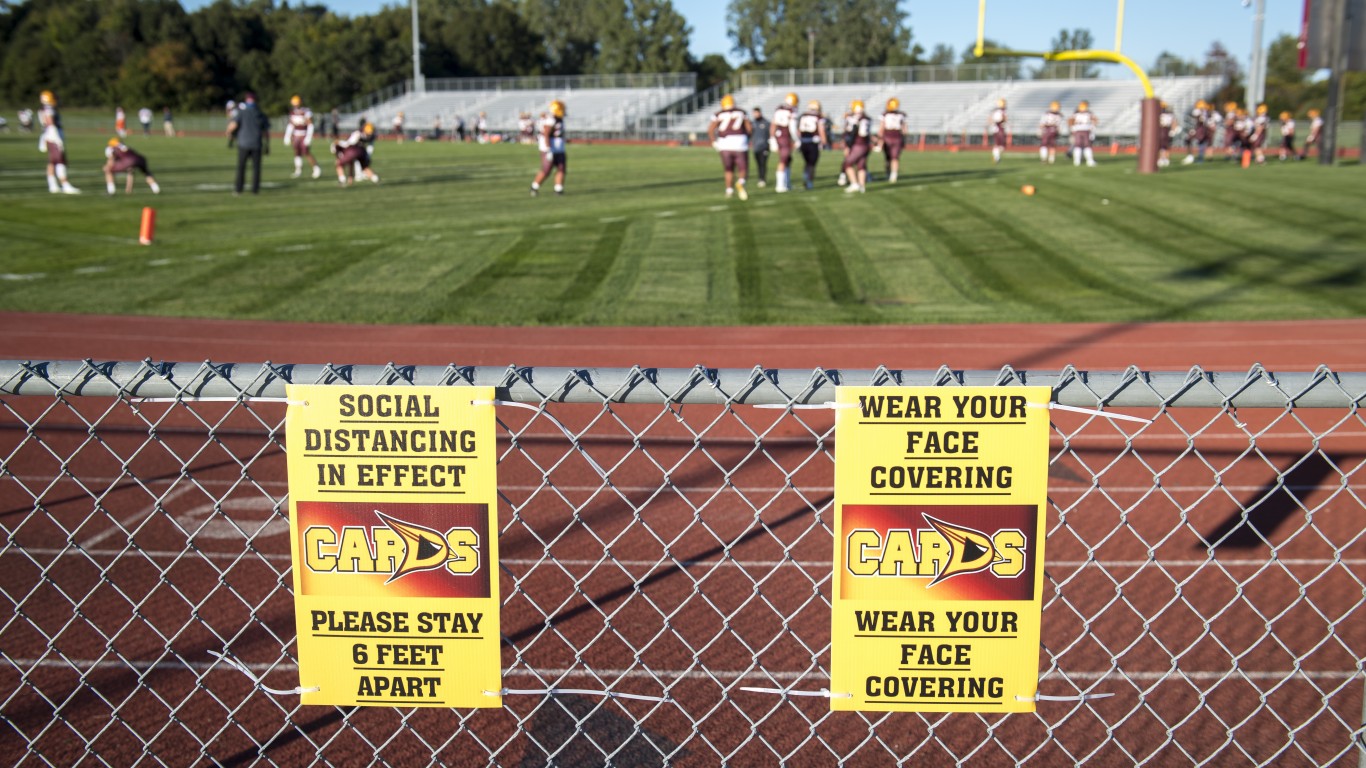
Michigan
> Measures taken: Many schools in the most populous counties stayed closed until after the winter break. High schools were allowed to resume in-person learning on Jan 4.
> Health screening recommendations: Daily temperature checks
> COVID-19 cases as of Jan 20: 5,901 per 100,000 people — 9th lowest (total: 589,869)
> Change avg. daily cases, Jan 12 – Jan 19: 3.0% — 5th smallest increase (from 570,150 to 587,448)
> Population: 10.0 million
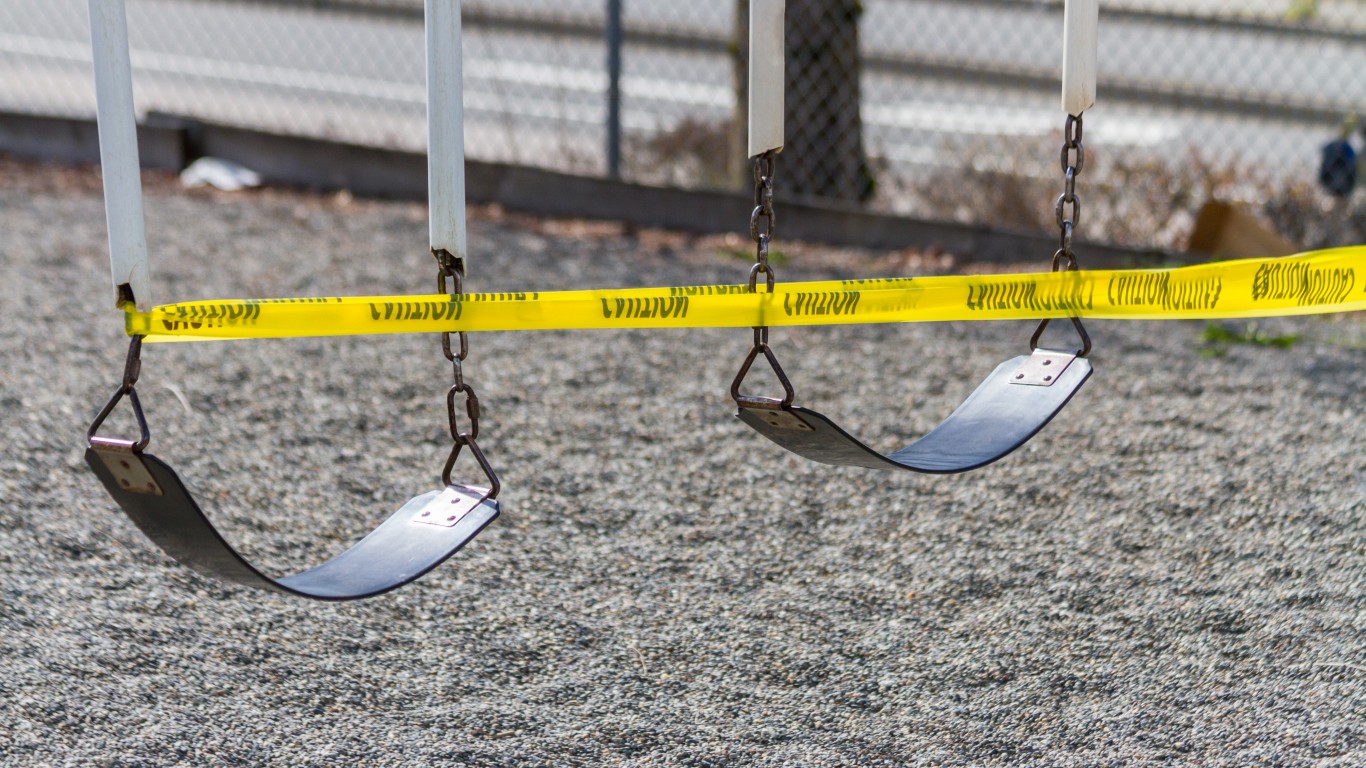
Minnesota
> Measures taken: Most of the state’s largest school districts are in distance learning for middle and high school students. Elementary schools reopened Jan 18.
> Health screening recommendations: Daily symptom screening and temperature checks
> COVID-19 cases as of Jan 20: 8,011 per 100,000 people — 22nd highest (total: 449,492)
> Change avg. daily cases, Jan 12 – Jan 19: 2.1% — 3rd smallest increase (from 438,867 to 448,268)
> Population: 5.6 million
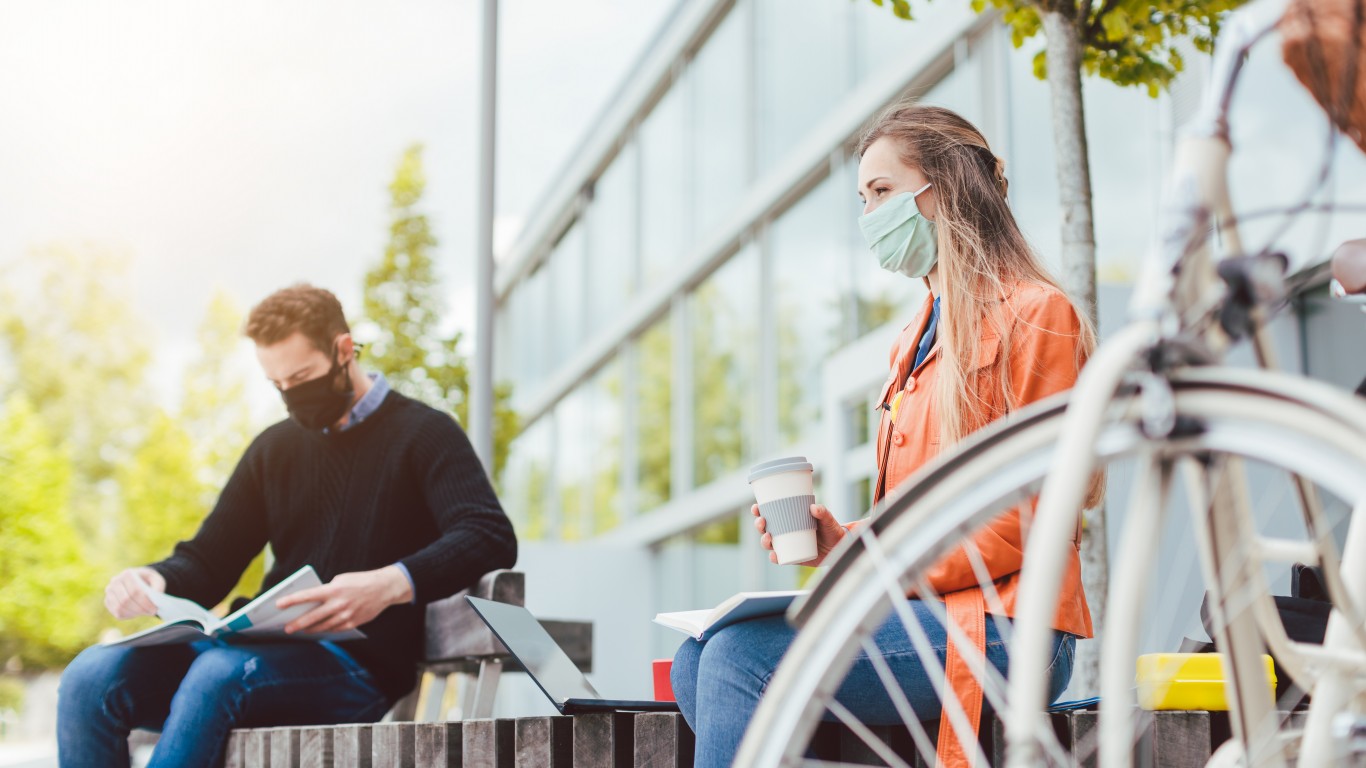
Mississippi
> Measures taken: Of the 688 schools in 69 counties across the state reporting COVID-19 cases, there have been a total of 350 outbreaks since the start of the school year, 7 in the week of Jan 4 -8.
> Health screening recommendations: Daily symptom screening and temperature checks
> COVID-19 cases as of Jan 20: 8,600 per 100,000 people — 18th highest (total: 256,827)
> Change avg. daily cases, Jan 12 – Jan 19: 5.4% — 24th largest increase (from 241,957 to 255,125)
> Population: 3.0 million
[in-text-ad-2]
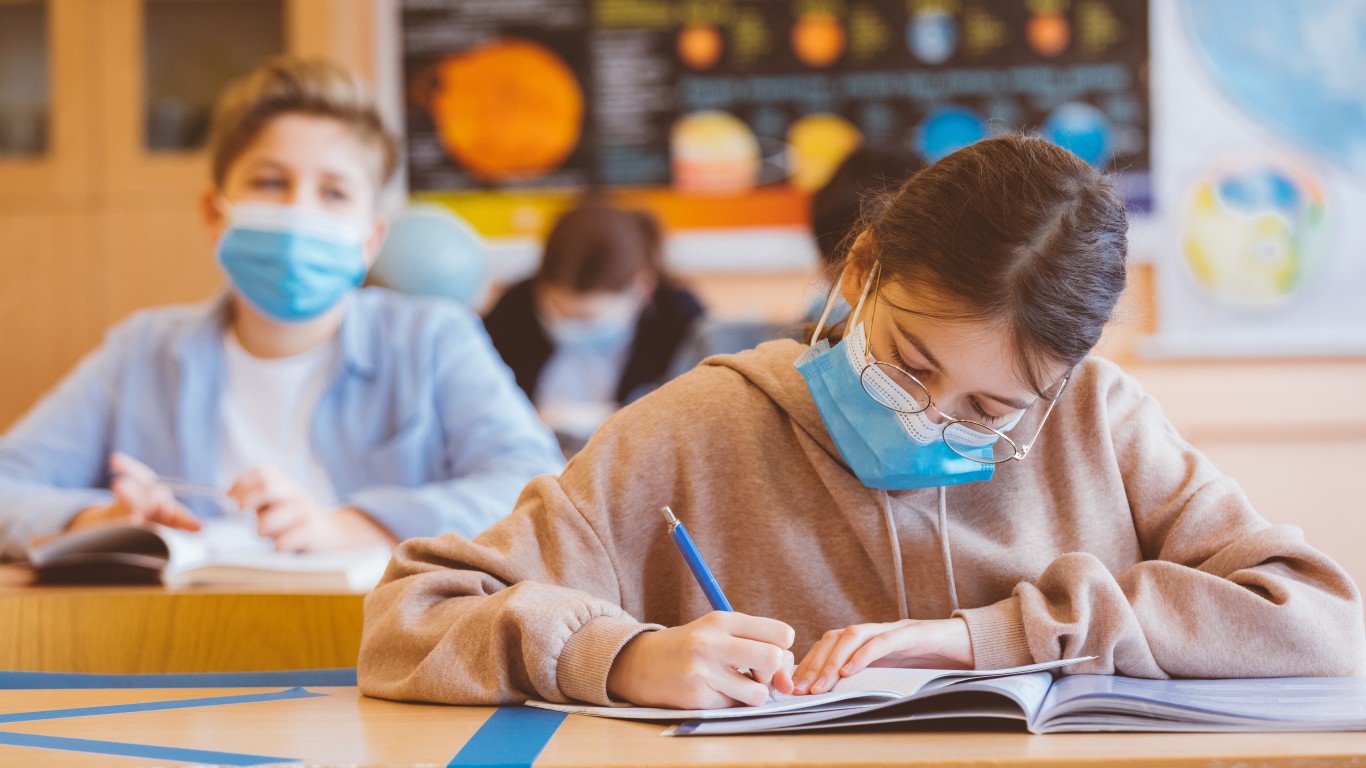
Missouri
> Measures taken: New mandates say that if people wear masks correctly and show no symptoms, they don’t have to quarantine for 14 days if exposed.
> Health screening recommendations: Daily symptom screening
> COVID-19 cases as of Jan 20: 7,211 per 100,000 people — 21st lowest (total: 441,789)
> Change avg. daily cases, Jan 12 – Jan 19: 3.1% — 6th smallest increase (from 427,117 to 440,197)
> Population: 6.1 million
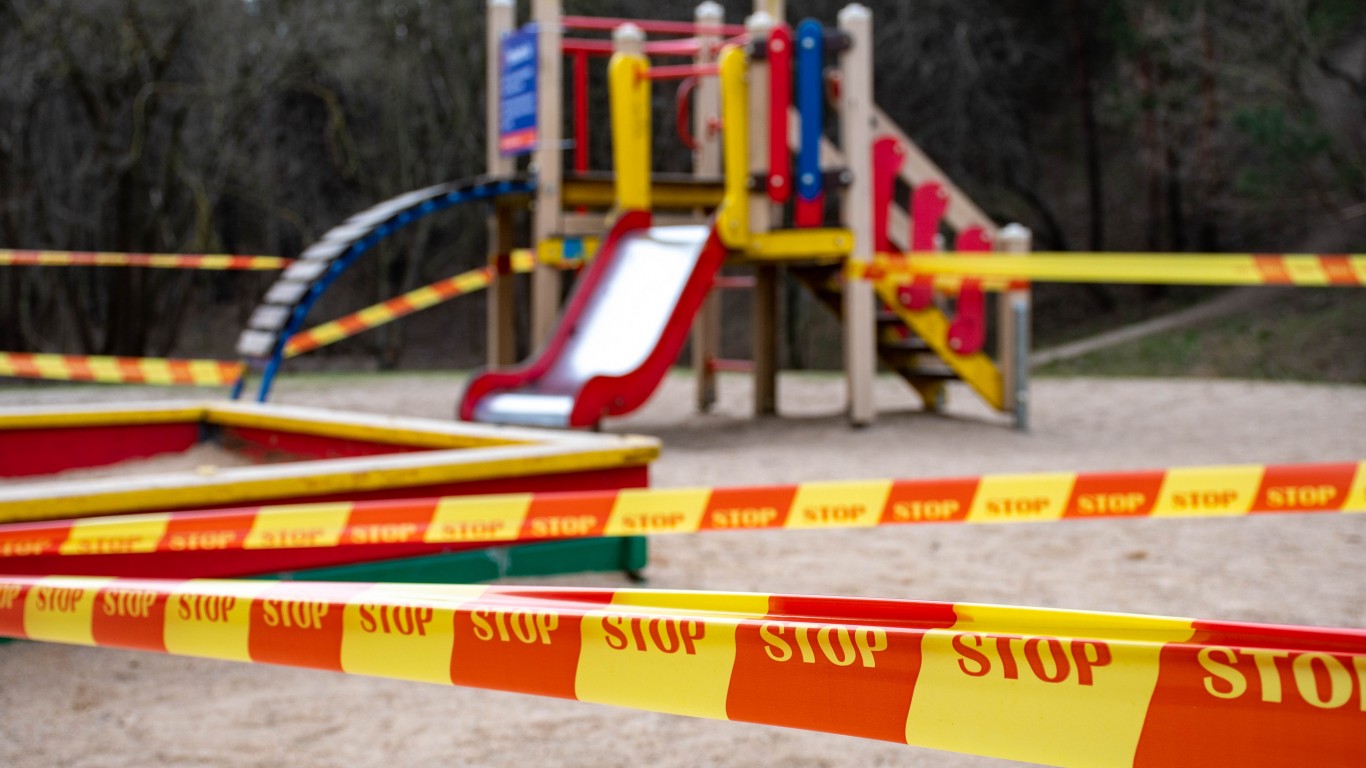
Montana
> Measures taken: More parents pull out their children from schools and sign them up for homeschooling. The official homeschool headcount in Oct 2020 was more than double what it was in Oct 2019.
> Health screening recommendations: Temperature checks for visitors
> COVID-19 cases as of Jan 20: 8,496 per 100,000 people — 19th highest (total: 90,255)
> Change avg. daily cases, Jan 12 – Jan 19: 3.2% — 9th smallest increase (from 87,077 to 89,864)
> Population: 1.1 million
[in-text-ad]
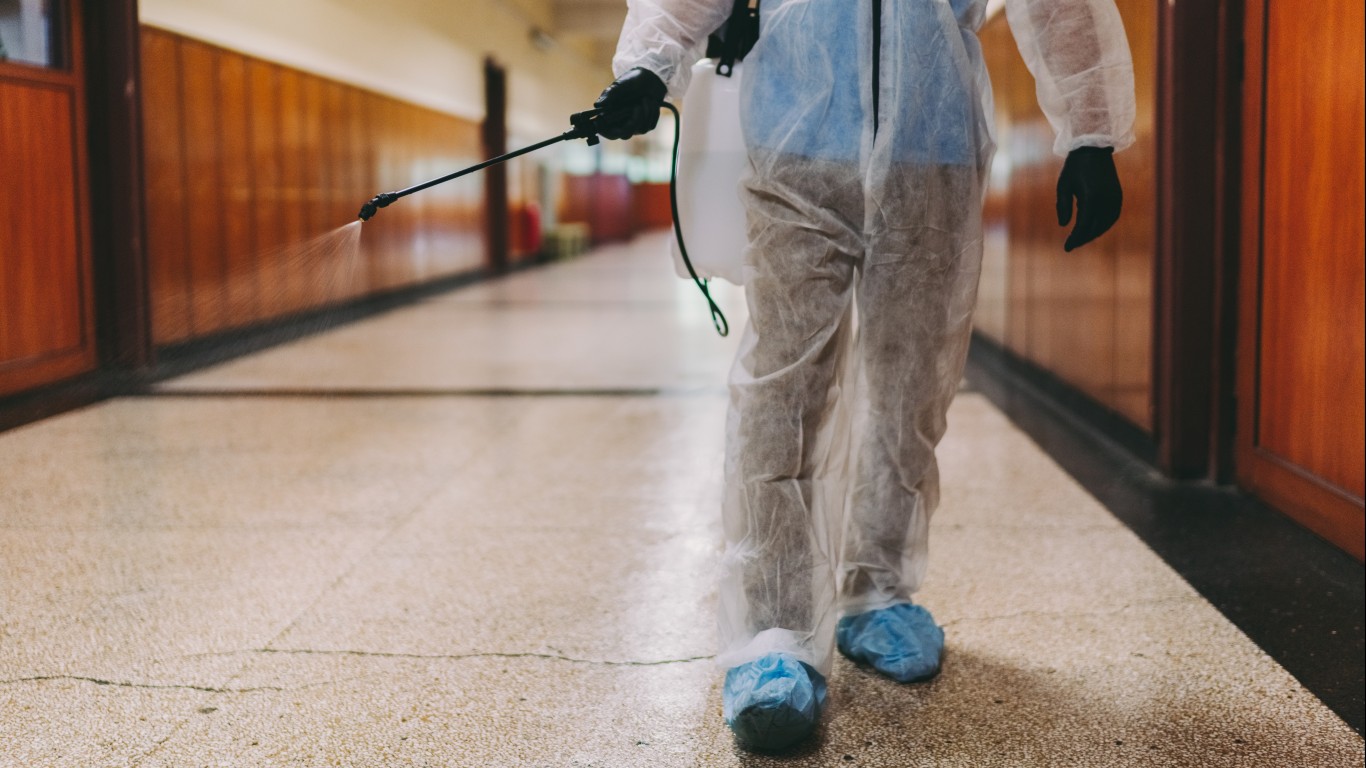
Nebraska
> Measures taken: Teachers unions want more restrictions amid a new surge of cases. Omaha teachers may be able to receive the COVID vaccine in January.
> Health screening recommendations: For visitors to wash hands before entering the school as well as students self-screen for symptoms
> COVID-19 cases as of Jan 20: 9,443 per 100,000 people — 8th highest (total: 182,176)
> Change avg. daily cases, Jan 12 – Jan 19: 3.1% — 7th smallest increase (from 176,670 to 182,176)
> Population: 1.9 million
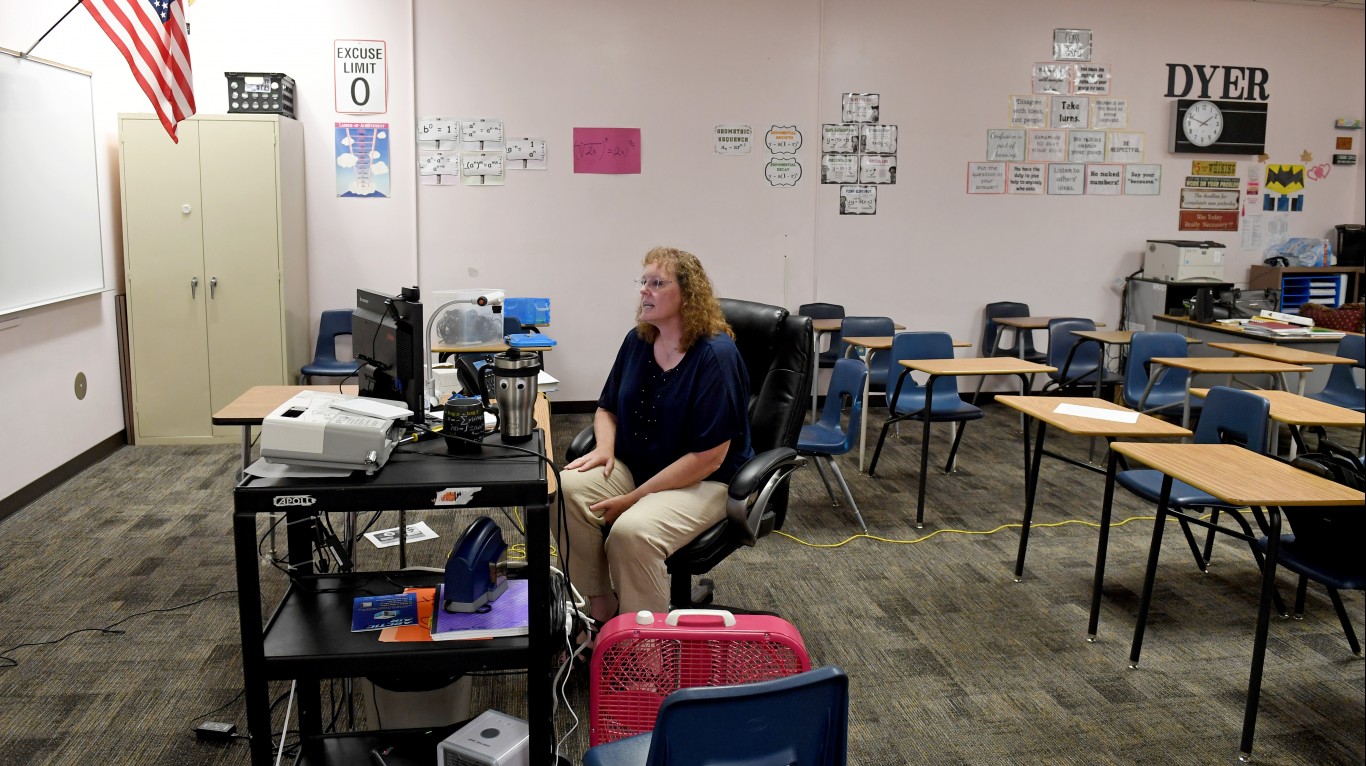
Nevada
> Measures taken: Schools started testing symptomatic students and staff with an antigen test. Some districts have been allowed to bypass regulations to hire substitute teachers.
> Health screening recommendations: Daily symptom screening and temperature checks as well as post signs about proper hand-washing and other ways to stop the virus
> COVID-19 cases as of Jan 20: 8,738 per 100,000 people — 16th highest (total: 265,143)
> Change avg. daily cases, Jan 12 – Jan 19: 4.4% — 19th smallest increase (from 252,842 to 263,972)
> Population: 3.0 million
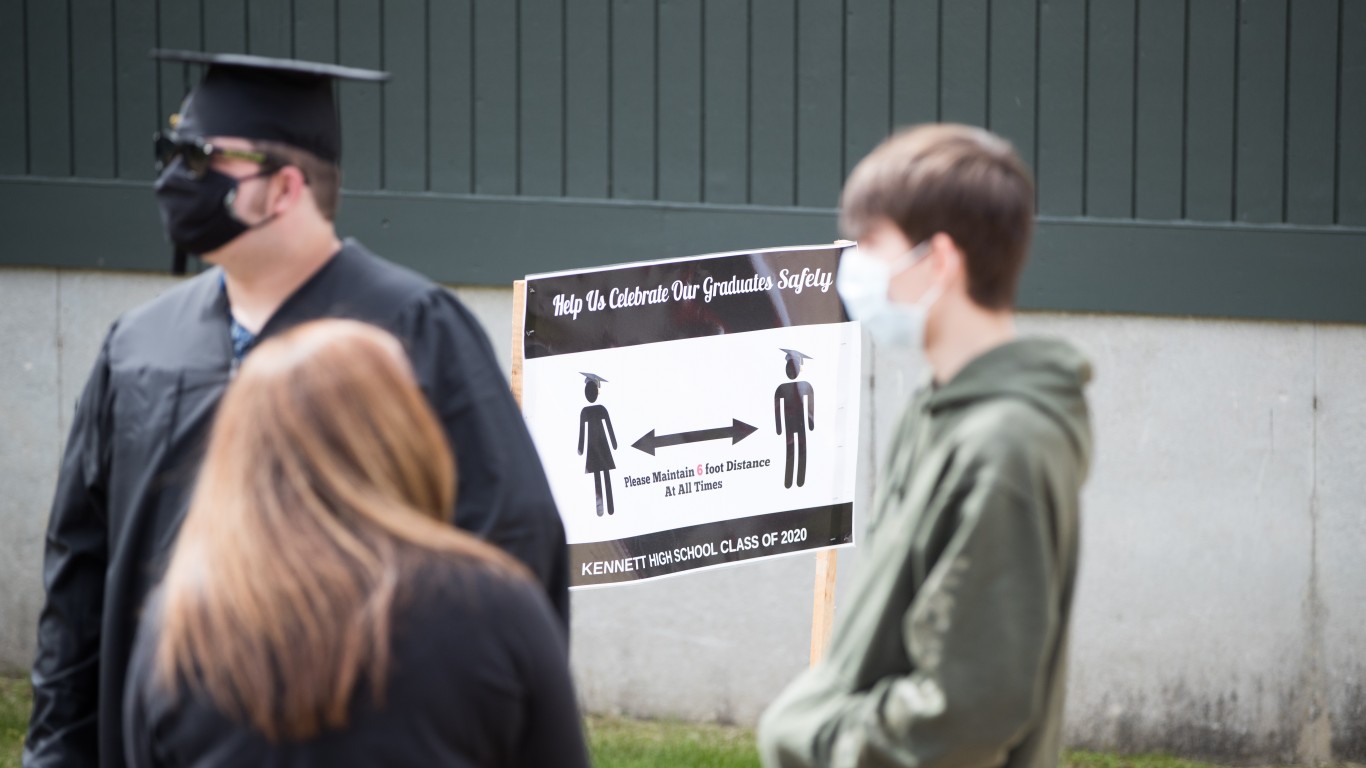
New Hampshire
> Measures taken: Some schools are forced to move online due to staffing shortages as teachers and staff have to quarantine.
> Health screening recommendations: Daily symptom screenings for staff and students
> COVID-19 cases as of Jan 20: 4,382 per 100,000 people — 6th lowest (total: 59,437)
> Change avg. daily cases, Jan 12 – Jan 19: 10.5% — 4th largest increase (from 53,148 to 58,709)
> Population: 1.4 million
[in-text-ad-2]
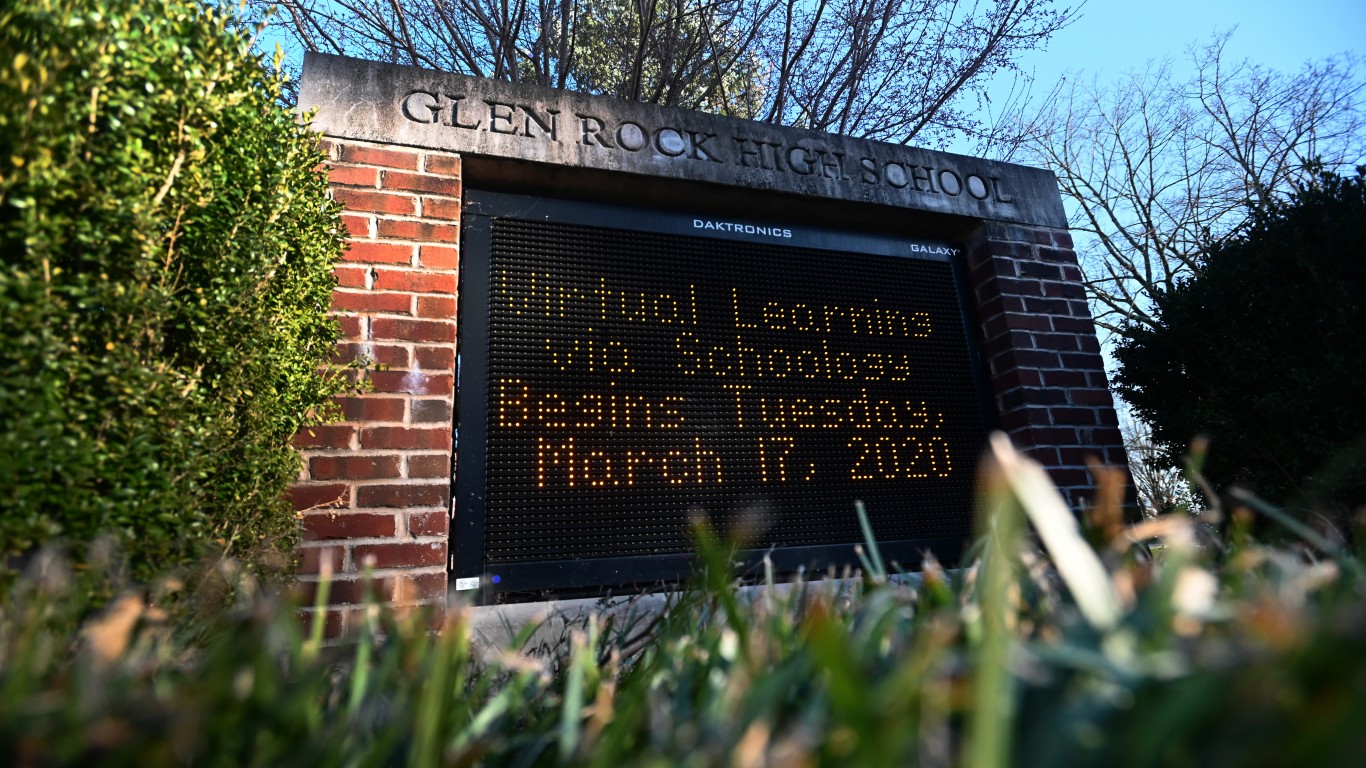
New Jersey
> Measures taken: 77 school districts started the school after the winter break with full in-person classes, 339 started remotely. 100+ outbreaks reported among students and staff since the start of the school year.
> Health screening recommendations: Daily symptom screening
> COVID-19 cases as of Jan 20: 7,196 per 100,000 people — 19th lowest (total: 641,088)
> Change avg. daily cases, Jan 12 – Jan 19: 6.9% — 16th largest increase (from 594,686 to 635,648)
> Population: 8.9 million
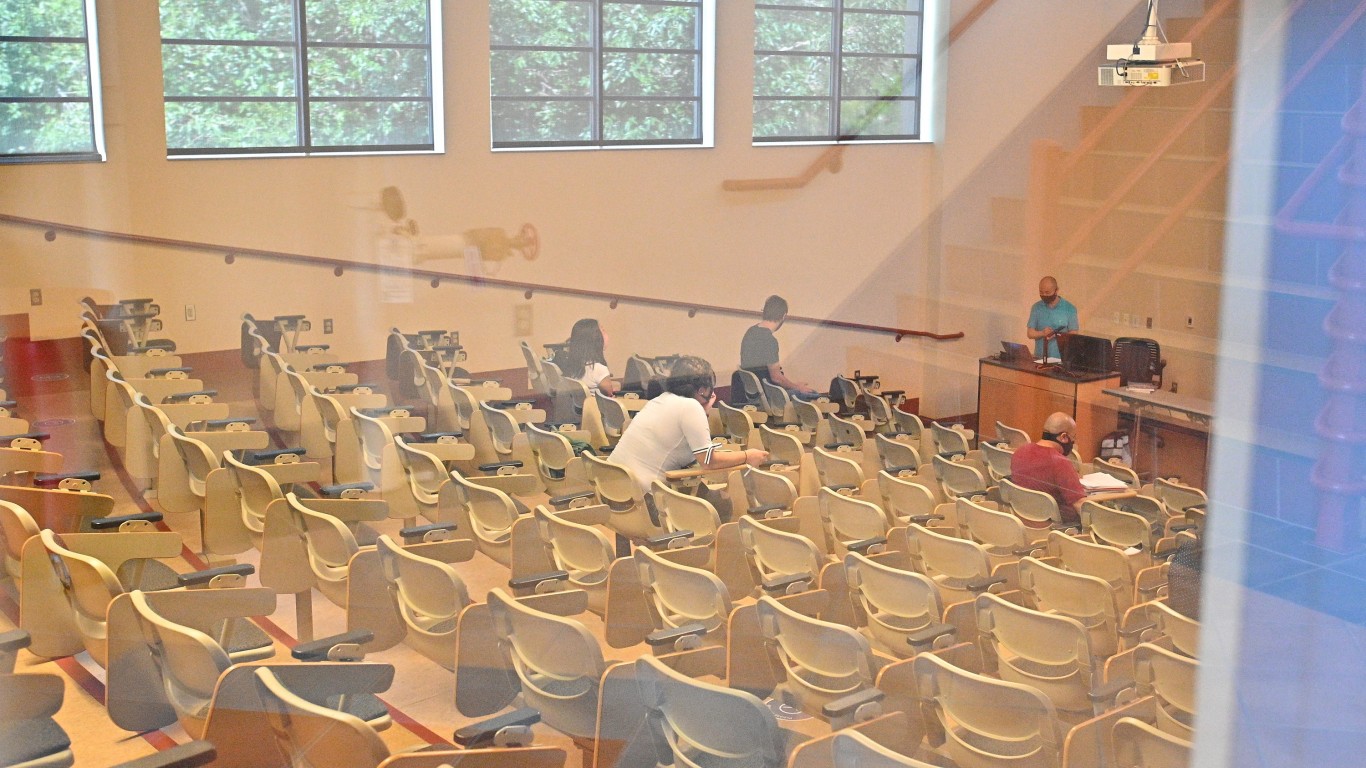
New Mexico
> Measures taken: Rio Rancho Public Schools moved to full-time online instruction until Jan 18. No in-person learning was allowed in the state during the weeks of Jan 4 – 11.
> Health screening recommendations: Daily temperature checks
> COVID-19 cases as of Jan 20: 7,872 per 100,000 people — 23rd highest (total: 164,954)
> Change avg. daily cases, Jan 12 – Jan 19: 4.4% — 20th smallest increase (from 157,974 to 164,954)
> Population: 2.1 million
[in-text-ad]
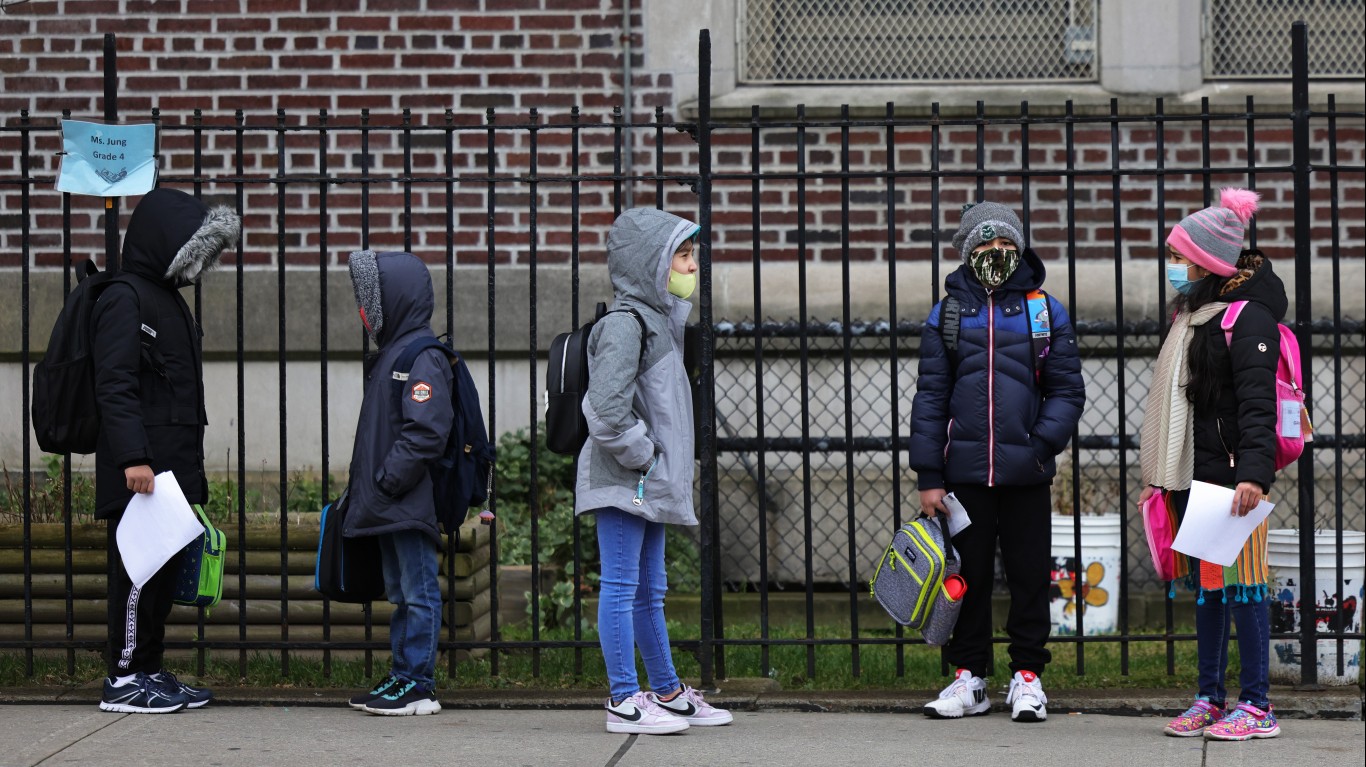
New York
> Measures taken: Elementary schools in NYC can open for students whose parents agree to weekly tests. Hundreds of schools are fully or partially closed. Closures were cut to 10 days, instead of 14, as per CDC guidelines.
> Health screening recommendations: Daily temperature checks for all
> COVID-19 cases as of Jan 20: 6,506 per 100,000 people — 12th lowest (total: 1,271,451)
> Change avg. daily cases, Jan 12 – Jan 19: 8.9% — 7th largest increase (from 1,155,370 to 1,258,087)
> Population: 19.5 million
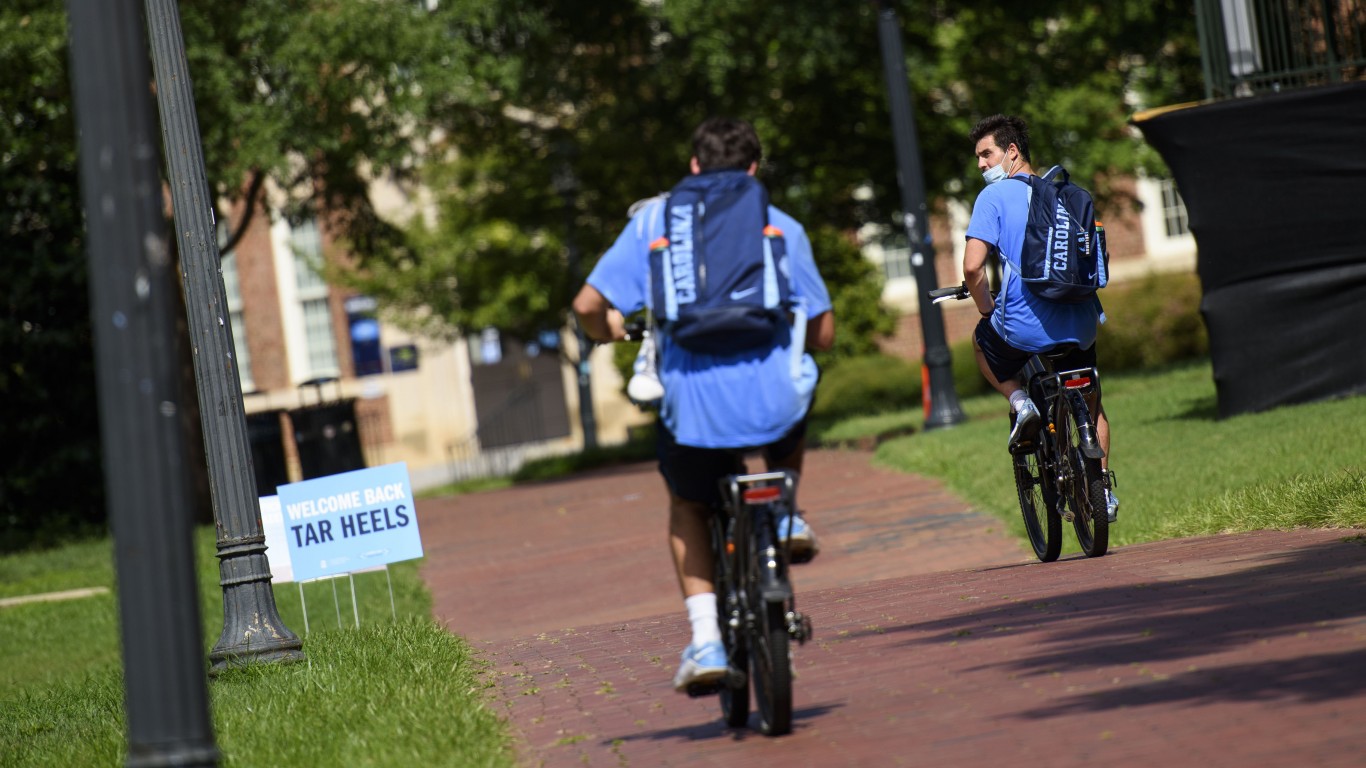
North Carolina
> Measures taken: The Johnston County school board voted 5-2 to suspend in-person classes. Charlotte-Mecklenburg Schools moved to online learning until Feb 12.
> Health screening recommendations: Daily temperature checks
> COVID-19 cases as of Jan 20: 6,654 per 100,000 people — 16th lowest (total: 690,912)
> Change avg. daily cases, Jan 12 – Jan 19: 7.6% — 10th largest increase (from 635,975 to 684,497)
> Population: 10.4 million
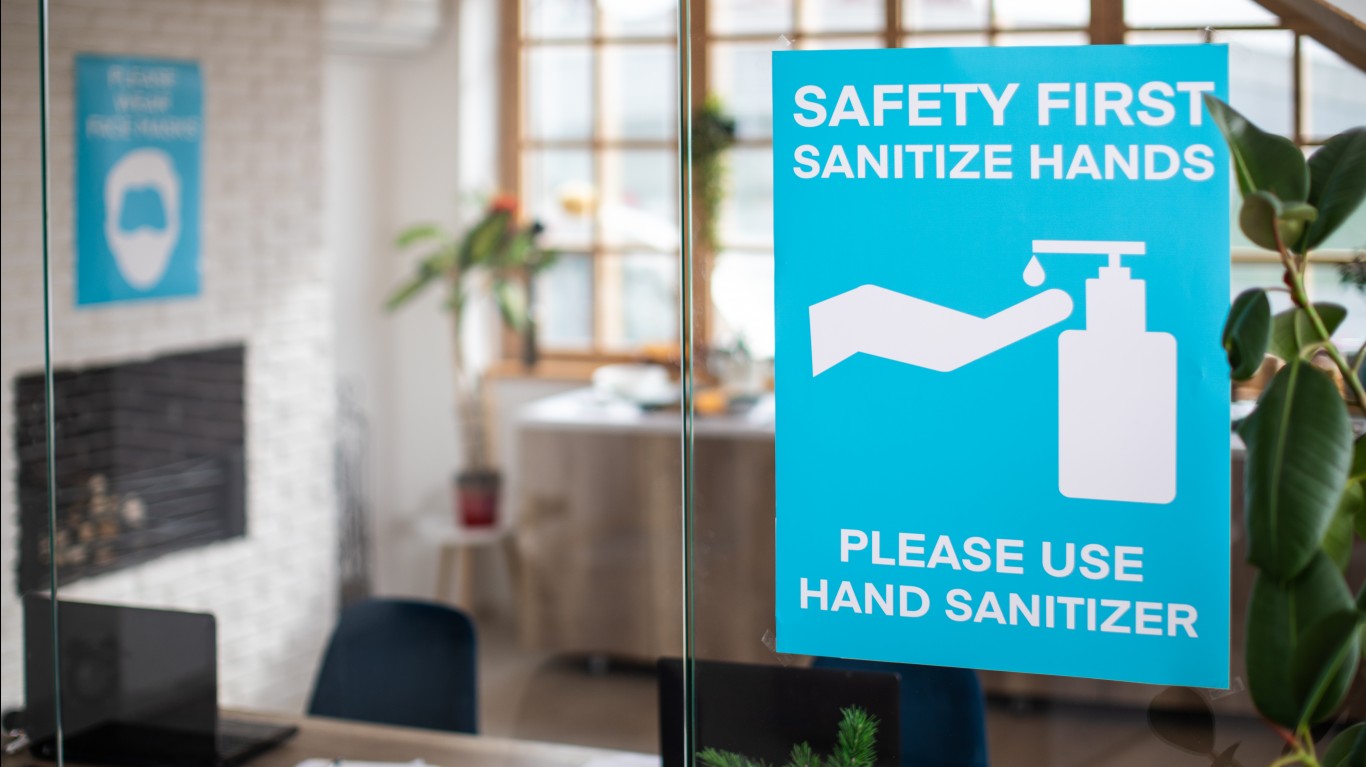
North Dakota
> Measures taken: The state started free rapid testing for K-12 teachers, staff and administrators.
> Health screening recommendations: Testing for COVID-19 based on risk level
> COVID-19 cases as of Jan 20: 12,660 per 100,000 people — the highest (total: 96,222)
> Change avg. daily cases, Jan 12 – Jan 19: 1.2% — the smallest increase (from 94,968 to 96,071)
> Population: 760,000
[in-text-ad-2]
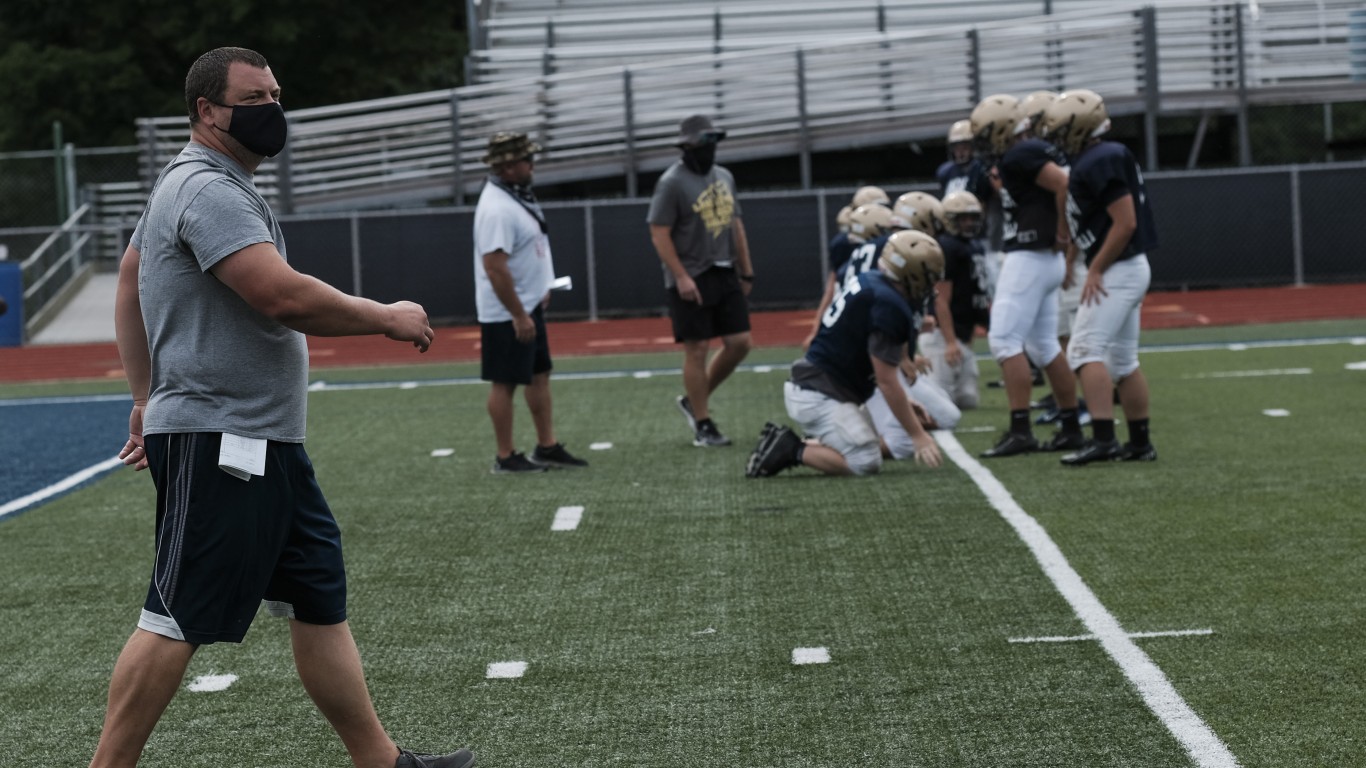
Ohio
> Measures taken: Ohio students who are exposed to COVID-19 are no longer asked to quarantine, if mask and distancing protocols are followed. Most Ohio schools plan to return to in-person learning by March 1. Efforts to vaccinate schools staff to start Feb 1.
> Health screening recommendations: Daily symptom screening
> COVID-19 cases as of Jan 20: 7,207 per 100,000 people — 20th lowest (total: 842,433)
> Change avg. daily cases, Jan 12 – Jan 19: 5.4% — 25th largest increase (from 792,938 to 836,055)
> Population: 11.7 million
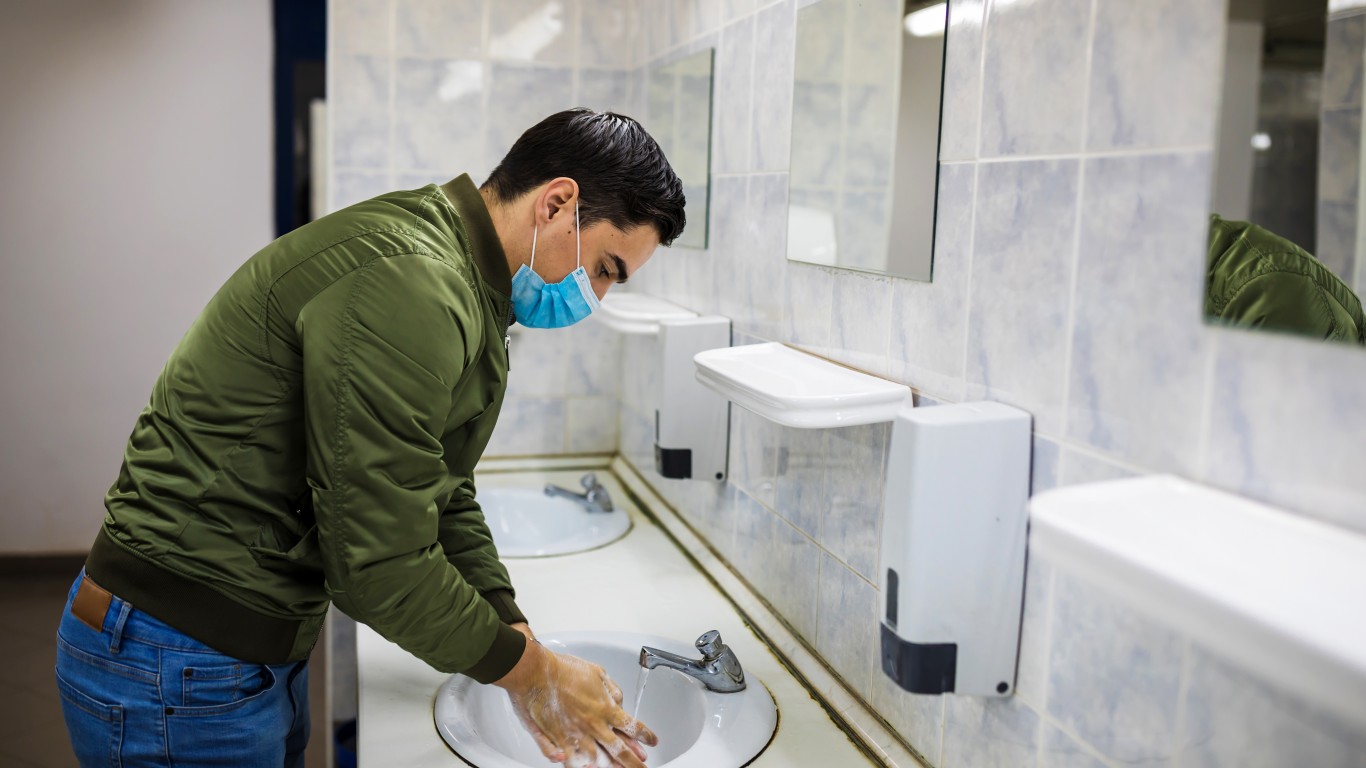
Oklahoma
> Measures taken: Teachers are now eligible to get the COVID-19 vaccine. Use of masks will be enforced. Unless students or staff are showing symptoms, they don’t have to quarantine.
> Health screening recommendations: Daily temperature checks at home
> COVID-19 cases as of Jan 20: 9,139 per 100,000 people — 10th highest (total: 360,360)
> Change avg. daily cases, Jan 12 – Jan 19: 6.2% — 19th largest increase (from 337,457 to 358,374)
> Population: 3.9 million
[in-text-ad]
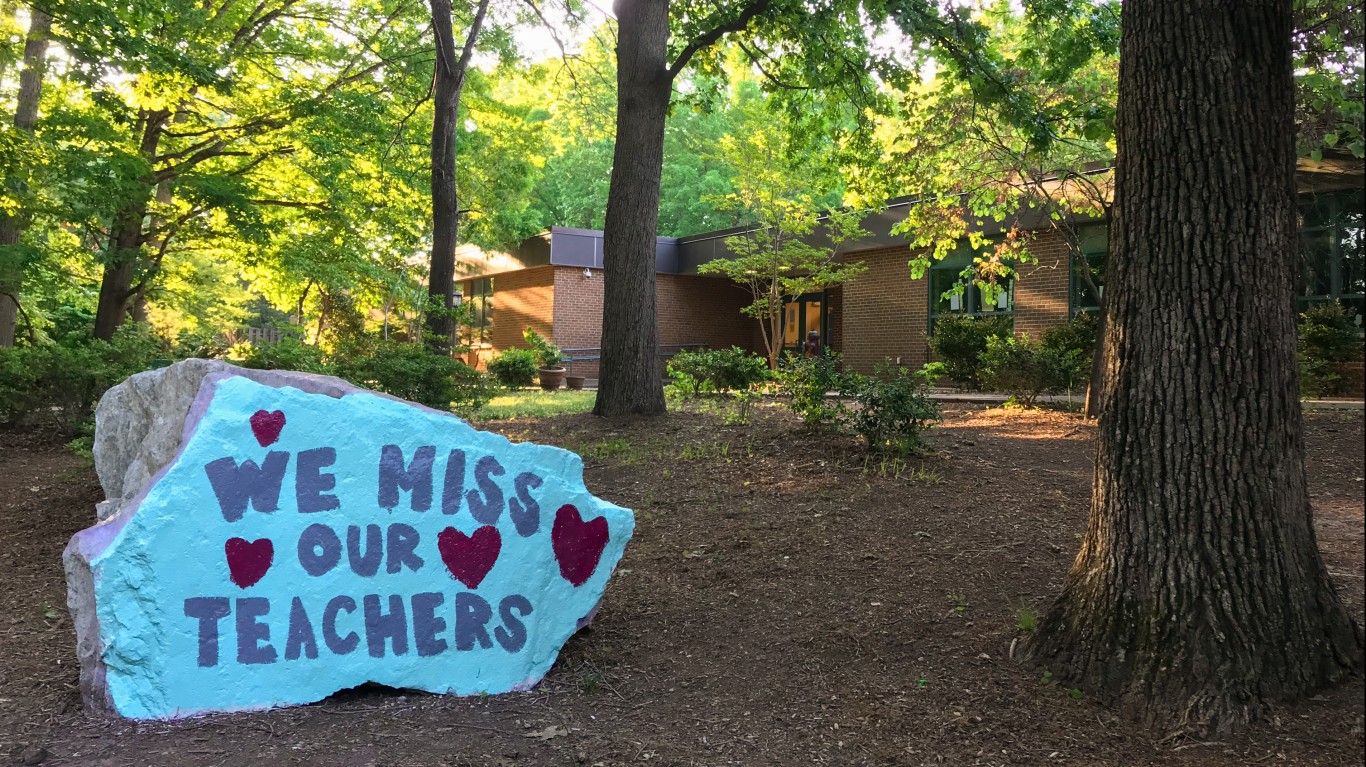
Oregon
> Measures taken: Schools are advised to reopen for elementary on-site and hybrid transition when there are 350 COVID-19 cases per 100,000 in a county, up from 200 or below.
> Health screening recommendations: Daily symptom screening and temperature checks
> COVID-19 cases as of Jan 20: 3,209 per 100,000 people — 4th lowest (total: 134,468)
> Change avg. daily cases, Jan 12 – Jan 19: 6.2% — 18th largest increase (from 126,607 to 134,468)
> Population: 4.2 million
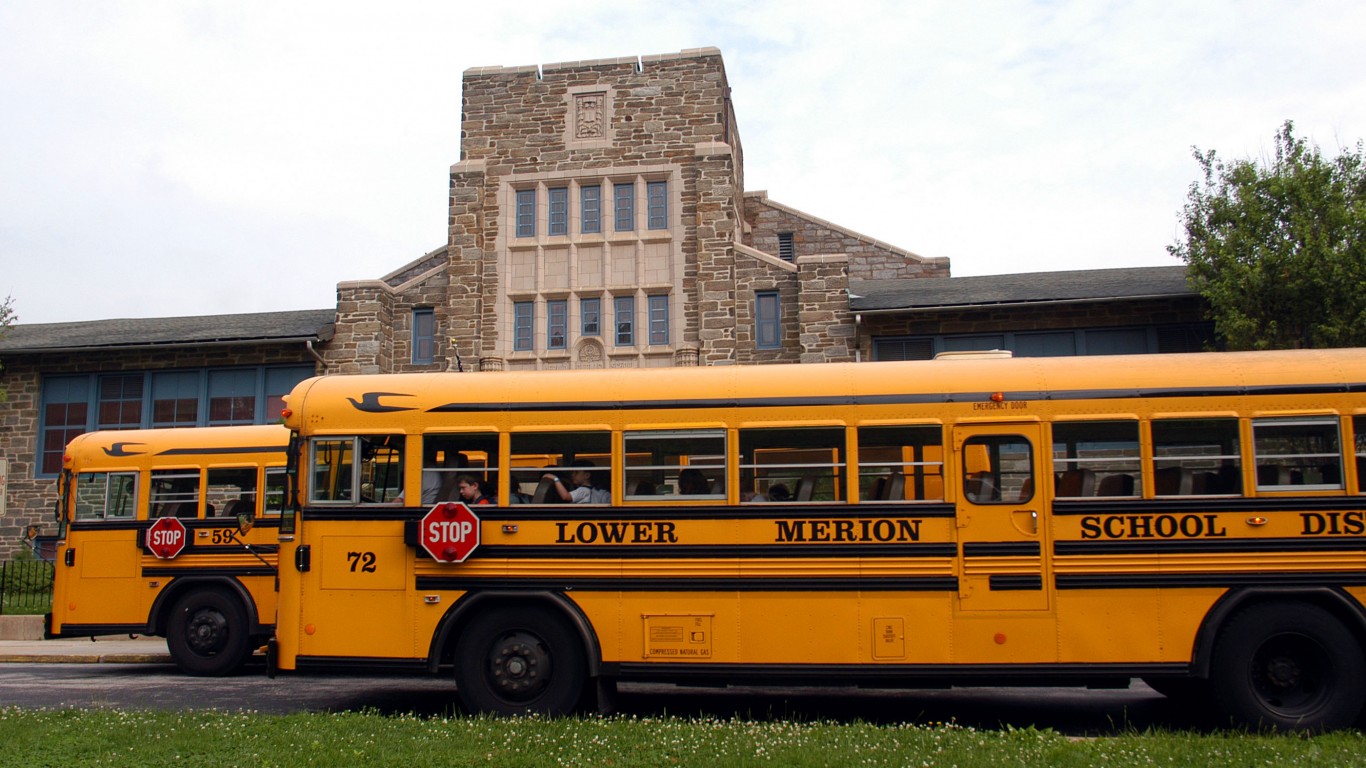
Pennsylvania
> Measures taken: Schools must close if they reach a certain number of COVID-19 cases. Nearly all districts have submitted forms attesting that they are following safety protocols, a requirement to stay open.
> Health screening recommendations: Daily symptom screening
> COVID-19 cases as of Jan 20: 6,115 per 100,000 people — 10th lowest (total: 783,170)
> Change avg. daily cases, Jan 12 – Jan 19: 6.0% — 20th largest increase (from 733,429 to 777,186)
> Population: 12.8 million
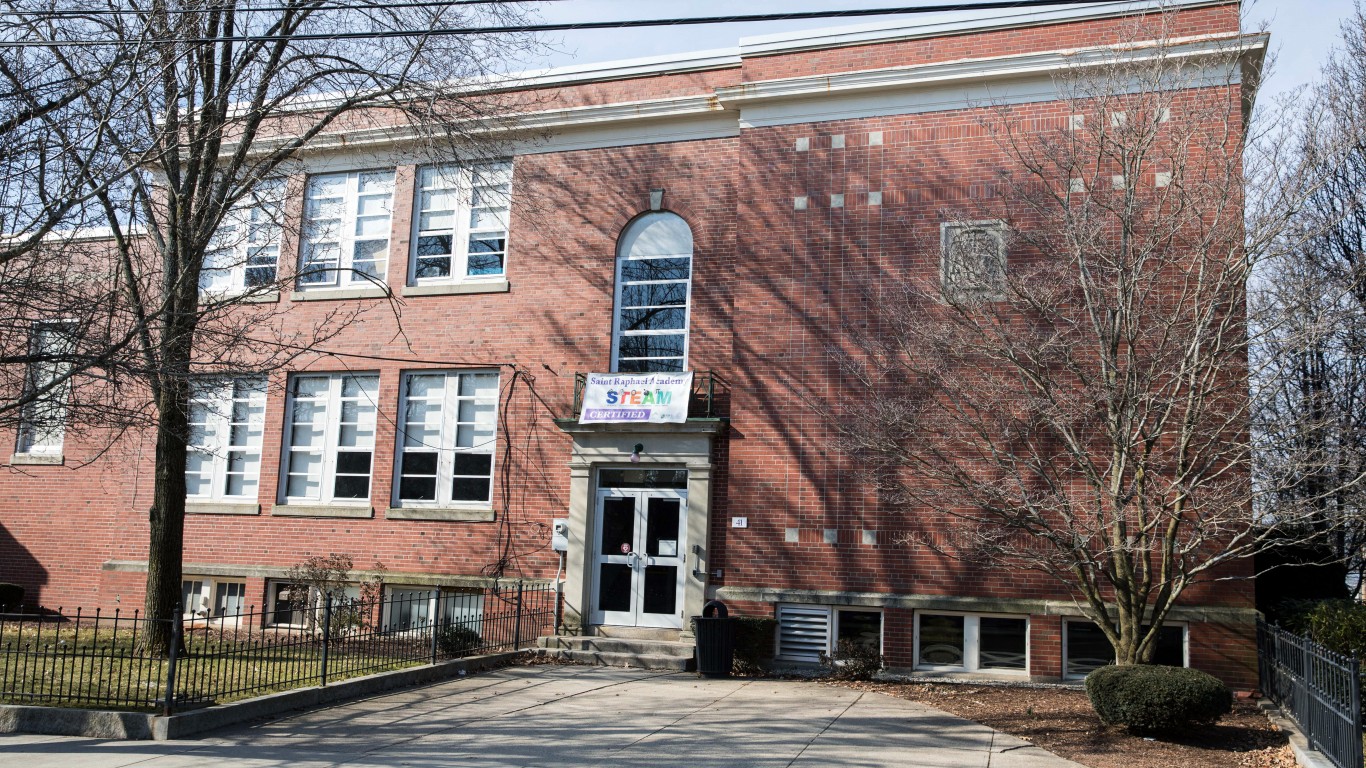
Rhode Island
> Measures taken: Public school districts reopened on a staggered schedule from Jan 7 – Jan 15. All sports were cancelled until January.
> Health screening recommendations: At-home or on-site symptom screening as well as temperature checks
> COVID-19 cases as of Jan 20: 10,203 per 100,000 people — 5th highest (total: 107,876)
> Change avg. daily cases, Jan 12 – Jan 19: 5.6% — 23rd largest increase (from 101,393 to 107,066)
> Population: 1.1 million
[in-text-ad-2]
South Carolina
> Measures taken: Public schools across the state started testing for COVID-19 for free in an attempt to help keep classrooms open.
> Health screening recommendations: Each school to come up with its own safety measures
> COVID-19 cases as of Jan 20: 7,865 per 100,000 people — 24th highest (total: 399,843)
> Change avg. daily cases, Jan 12 – Jan 19: 9.7% — 5th largest increase (from 359,357 to 394,318)
> Population: 5.1 million
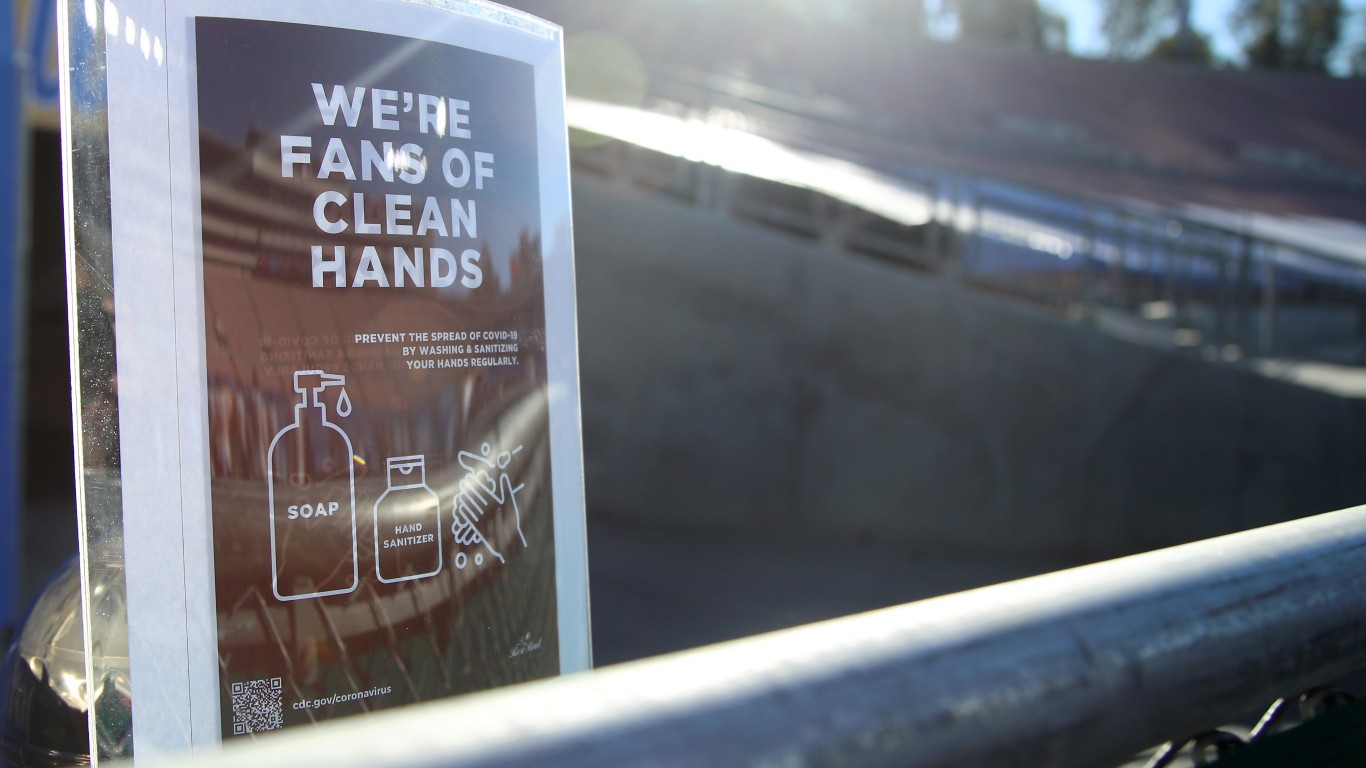
South Dakota
> Measures taken: South Dakota’s positivity rate is around 42%, suggesting testing is still very limited.
> Health screening recommendations: Daily symptom screening and temperature checks
> COVID-19 cases as of Jan 20: 10,764 per 100,000 people — 2nd highest (total: 94,967)
> Change avg. daily cases, Jan 12 – Jan 19: 1.6% — 2nd smallest increase (from 93,276 to 94,764)
> Population: 882,000
[in-text-ad]

Tennessee
> Measures taken: Many schools in the state are starting the spring semester fully remote for at least the first 2 weeks.
> Health screening recommendations: Daily symptom screening and temperature checks
> COVID-19 cases as of Jan 20: 10,255 per 100,000 people — 4th highest (total: 694,291)
> Change avg. daily cases, Jan 12 – Jan 19: 4.4% — 18th smallest increase (from 660,874 to 689,808)
> Population: 6.8 million
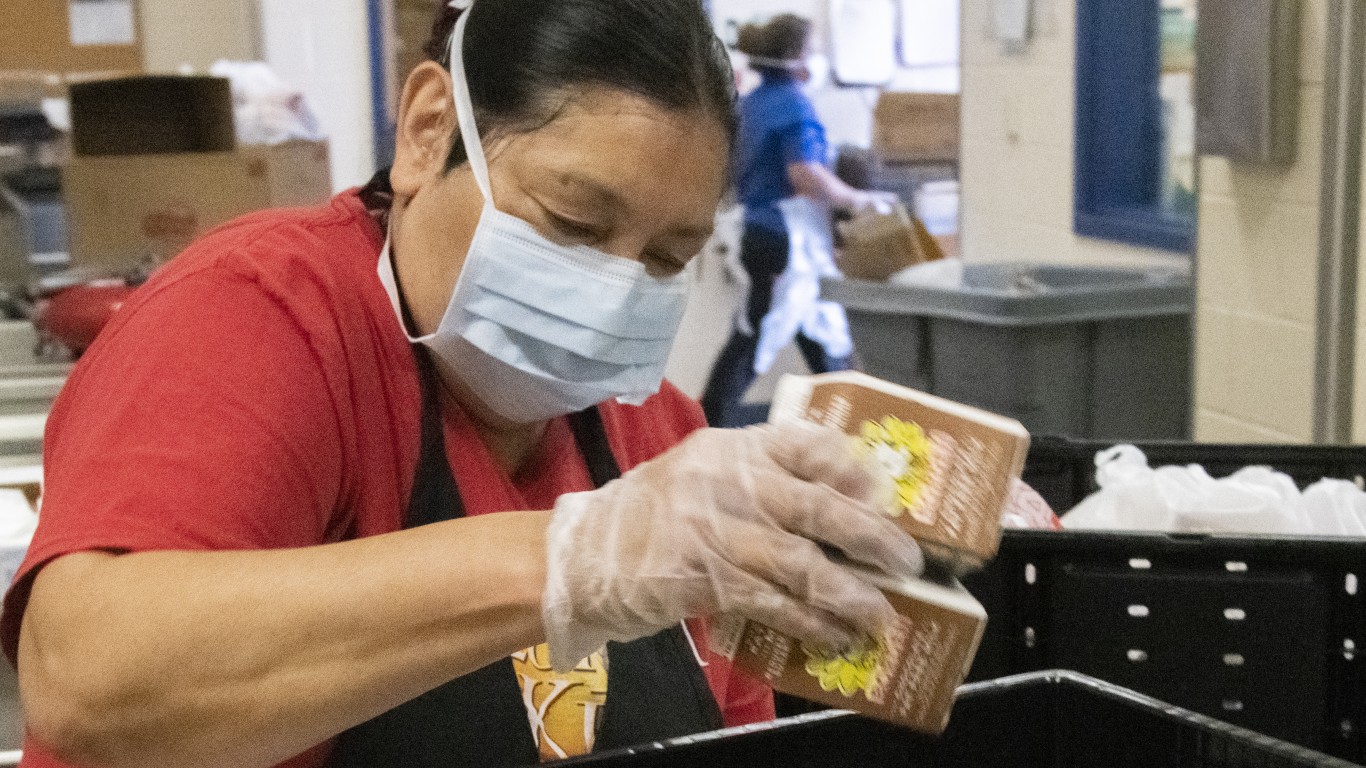
Texas
> Measures taken: New schools can’t opt-in to the K-12 COVID Testing Project to receive rapid tests. Those already in will continue to receive them.
> Health screening recommendations: Symptom self-screening for staff
> COVID-19 cases as of Jan 20: 7,548 per 100,000 people — 25th lowest (total: 2,166,283)
> Change avg. daily cases, Jan 12 – Jan 19: 7.0% — 14th largest increase (from 1,995,292 to 2,135,028)
> Population: 28.7 million
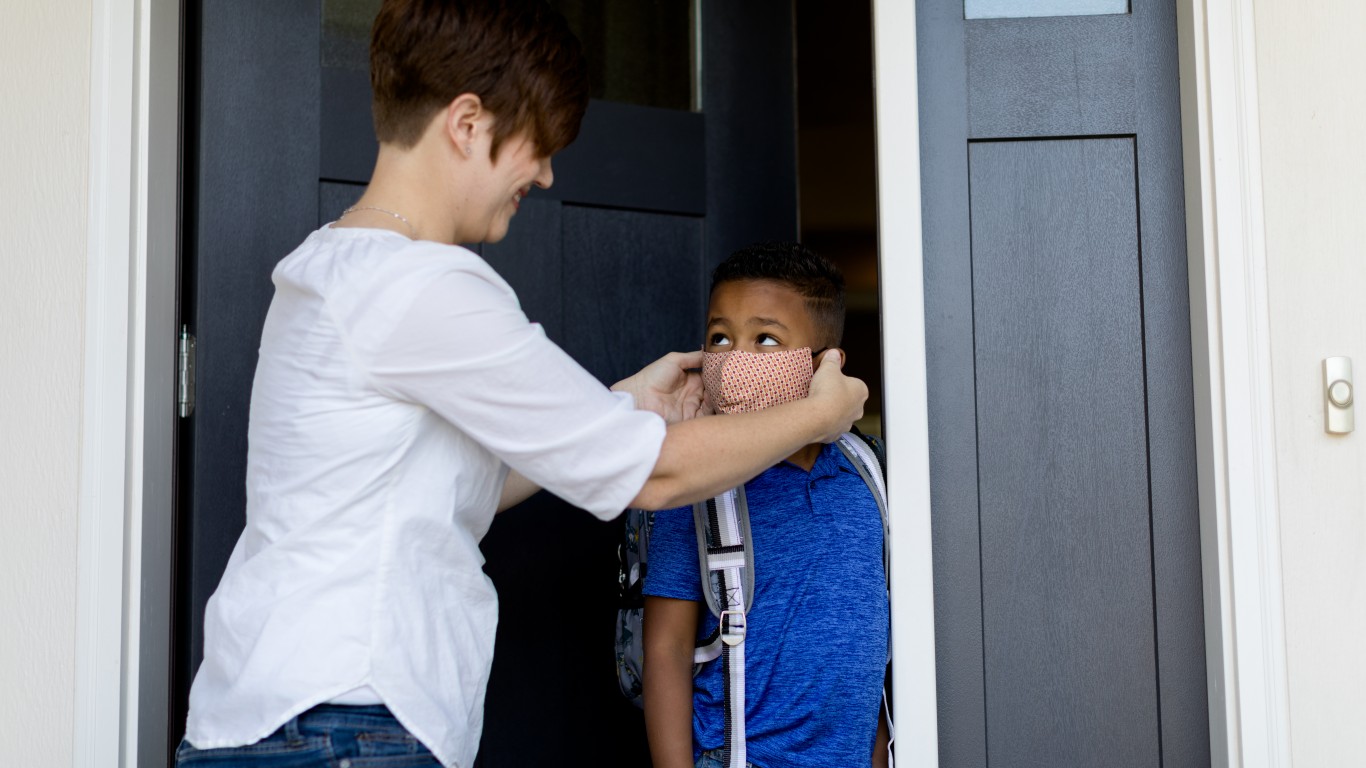
Utah
> Measures taken: Teachers are now eligible for COVID-19 vaccinations. Salt Lake City won’t reopen junior high and high schools for in-person instruction until teachers can get vaccinated.
> Health screening recommendations: For students and school staff to self-monitor for symptoms
> COVID-19 cases as of Jan 20: 10,388 per 100,000 people — 3rd highest (total: 328,380)
> Change avg. daily cases, Jan 12 – Jan 19: 5.4% — 23rd smallest increase (from 309,629 to 326,221)
> Population: 3.2 million
[in-text-ad-2]
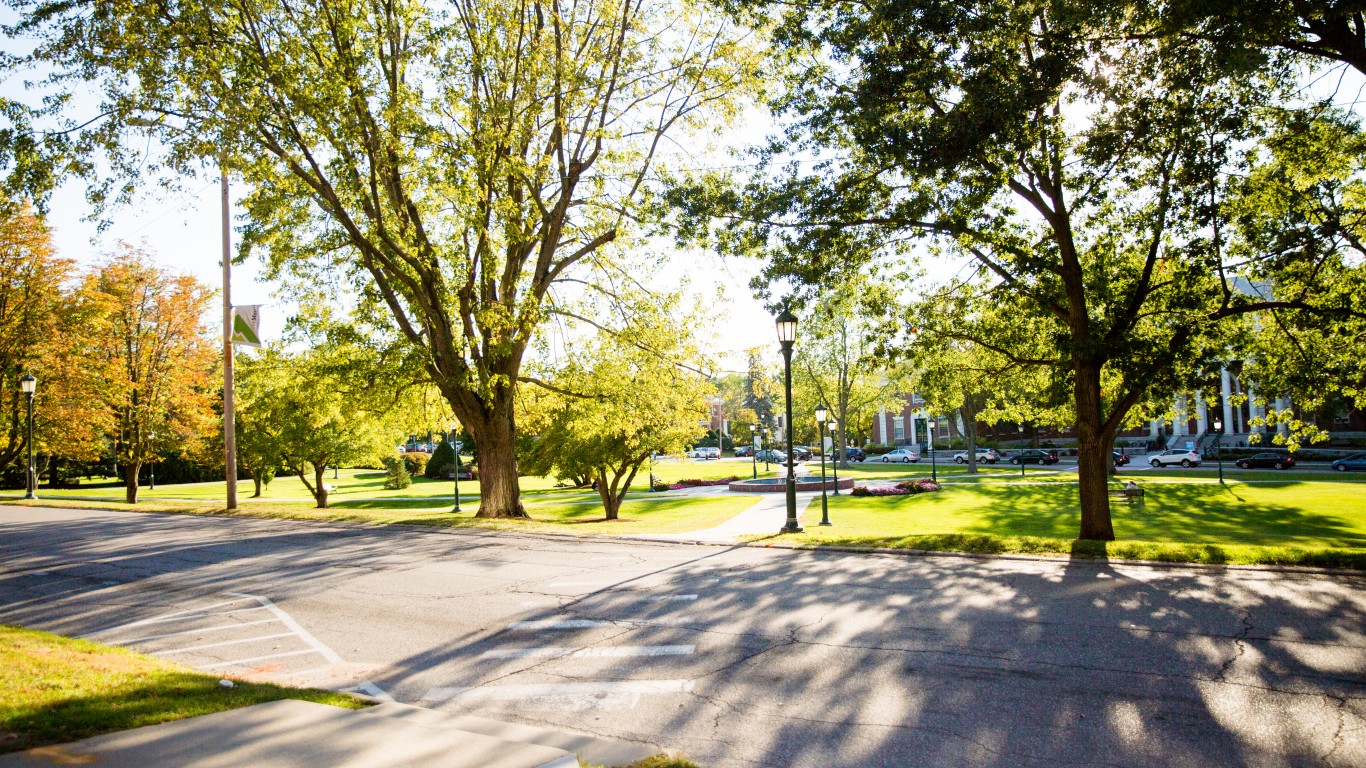
Vermont
> Measures taken: Asymptomatic teachers and staff members at all public schools in Vermont can take an on-site COVID-19 test.
> Health screening recommendations: Daily symptom screening at home
> COVID-19 cases as of Jan 20: 1,672 per 100,000 people — the lowest (total: 10,471)
> Change avg. daily cases, Jan 12 – Jan 19: 11.6% — 2nd largest increase (from 9,247 to 10,321)
> Population: 626,000
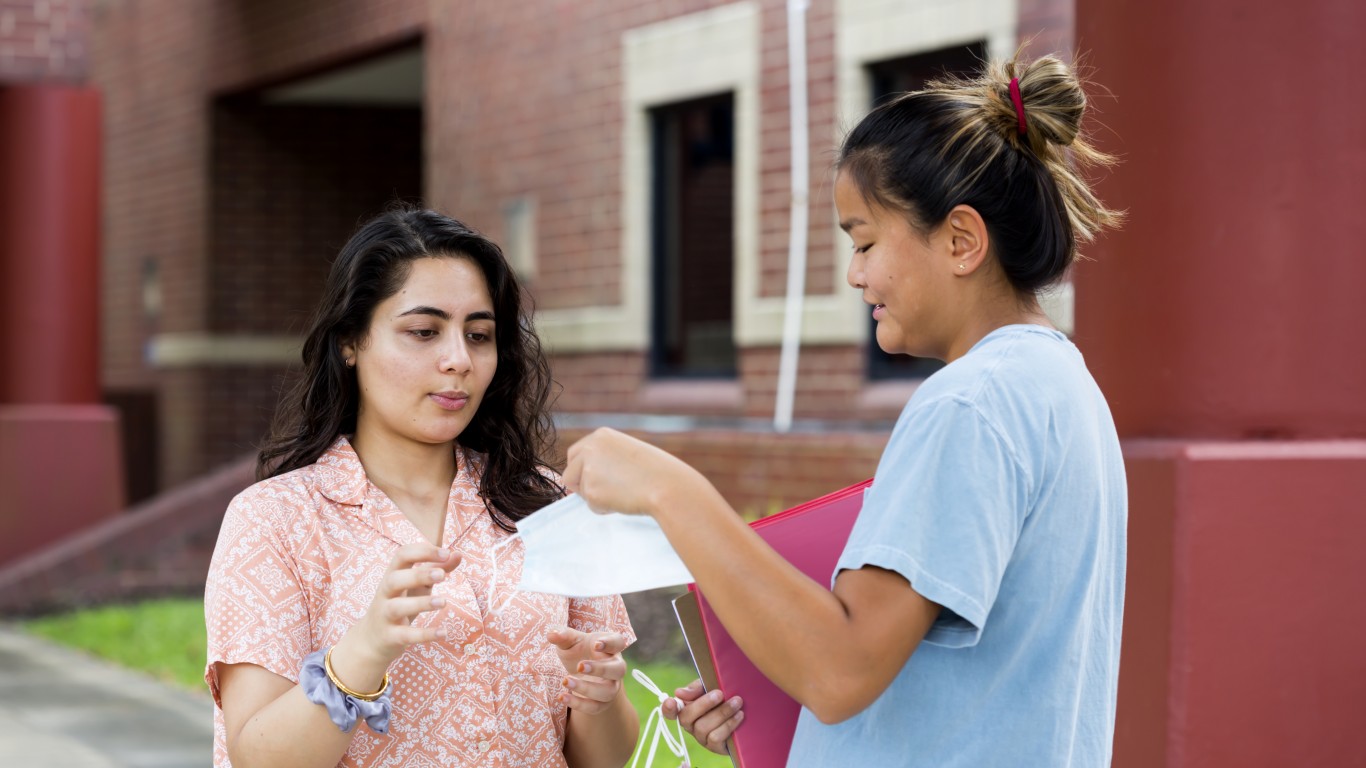
Virginia
> Measures taken: Henrico County Schools delayed in-person reopening. Fairfax County Public Schools is moving some students to full-time remote learning. Richmond Public Schools cancelled winter sports.
> Health screening recommendations: Daily symptom screenings
> COVID-19 cases as of Jan 20: 5,349 per 100,000 people — 7th lowest (total: 455,591)
> Change avg. daily cases, Jan 12 – Jan 19: 10.6% — 3rd largest increase (from 407,947 to 451,076)
> Population: 8.5 million
[in-text-ad]
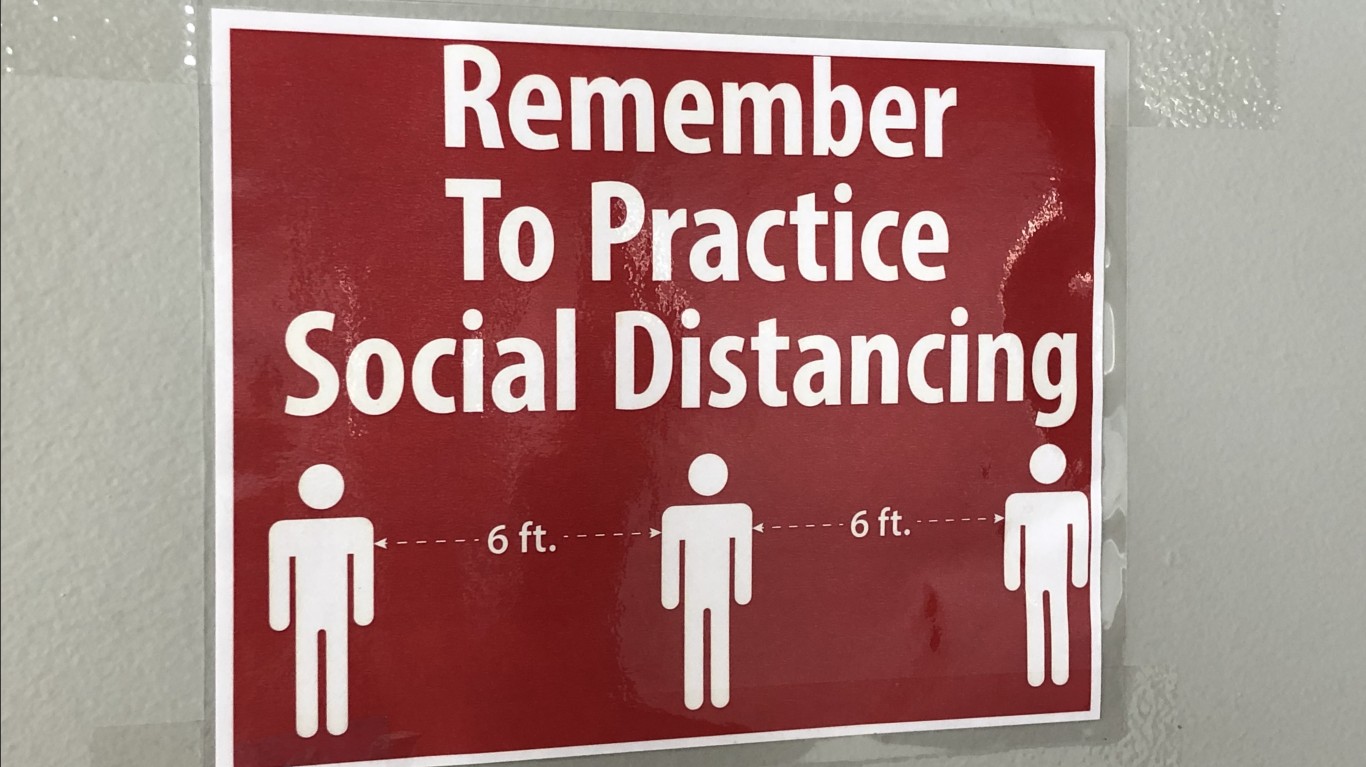
Washington
> Measures taken: Health officials recommended holding off on expanding in-person learning due to resurgence of COVID-19 cases. Public school in Seattle won’t open for in-person instruction until Jan 28.
> Health screening recommendations: Daily symptom screening and temperature checks
> COVID-19 cases as of Jan 20: 3,848 per 100,000 people — 5th lowest (total: 289,939)
> Change avg. daily cases, Jan 12 – Jan 19: 4.1% — 15th smallest increase (from 278,544 to 289,939)
> Population: 7.5 million
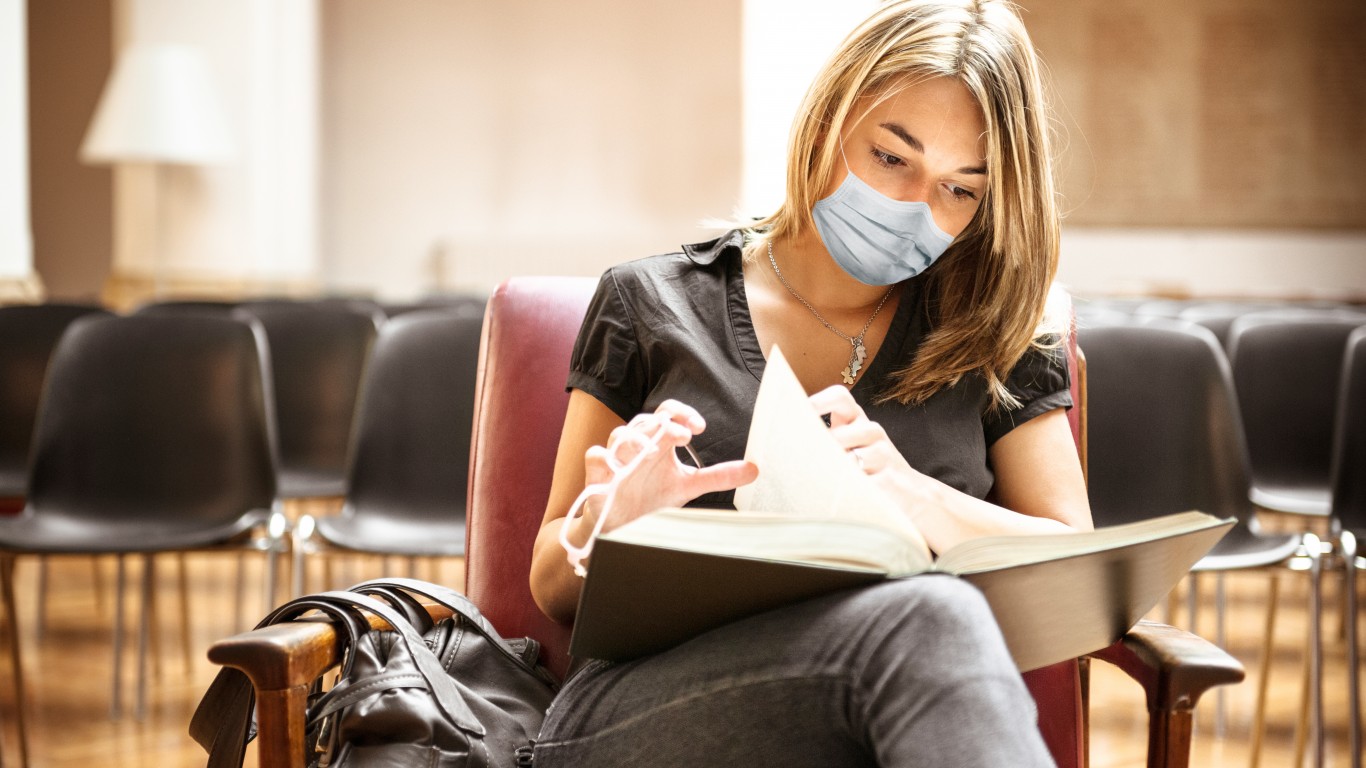
West Virginia
> Measures taken: Elementary, middle, and many high schools started reopening for in-person instruction on Jan 19.
> Health screening recommendations: Daily symptom screening and temperature checks
> COVID-19 cases as of Jan 20: 6,184 per 100,000 people — 11th lowest (total: 111,677)
> Change avg. daily cases, Jan 12 – Jan 19: 7.4% — 11th largest increase (from 103,203 to 110,820)
> Population: 1.8 million
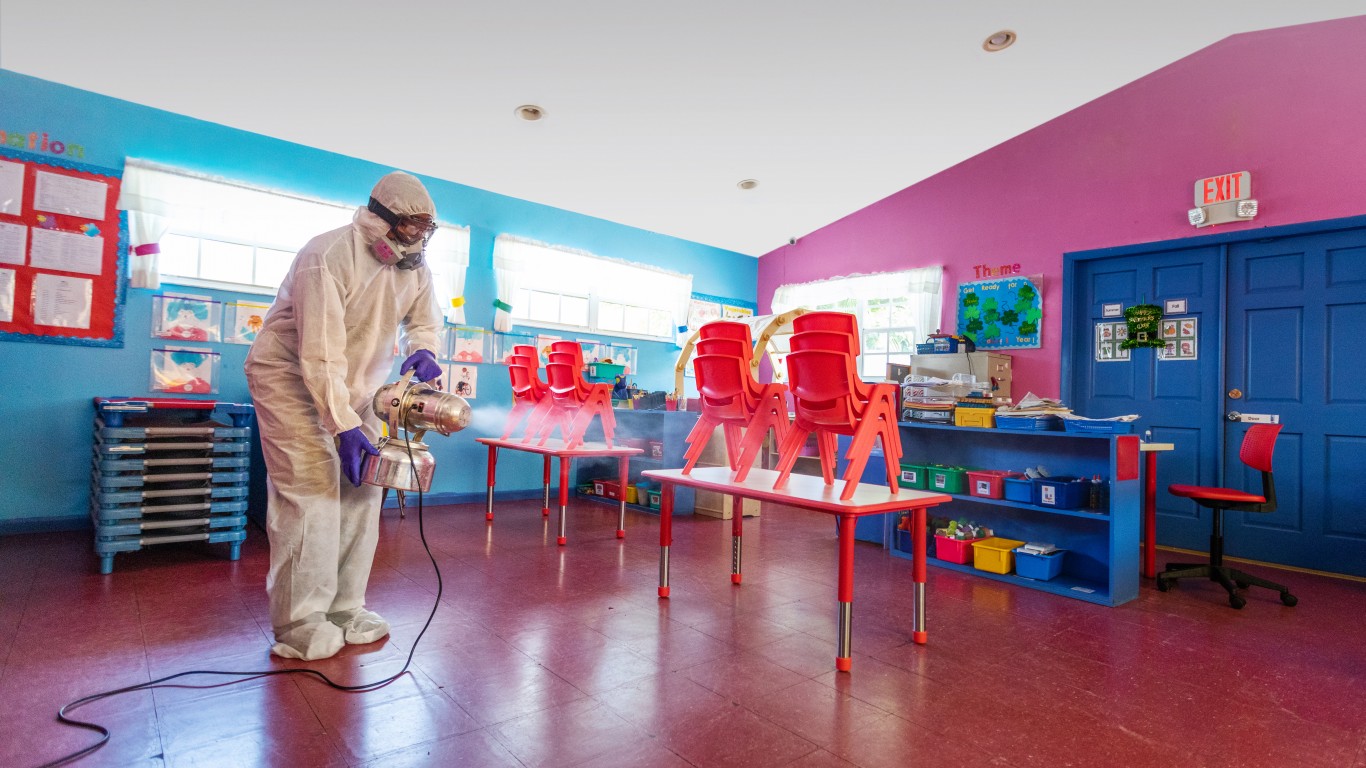
Wisconsin
> Measures taken: Schools in Racine, Wind Point, and Elmwood Park were closed until Jan 15. Appleton Area School District, the state’s sixth largest, started to open schools for in-person instruction on Jan 19.
> Health screening recommendations: Daily symptom screening and temperature checks recommended
> COVID-19 cases as of Jan 20: 9,046 per 100,000 people — 12th highest (total: 525,924)
> Change avg. daily cases, Jan 12 – Jan 19: 2.6% — 4th smallest increase (from 511,136 to 524,402)
> Population: 5.8 million
[in-text-ad-2]
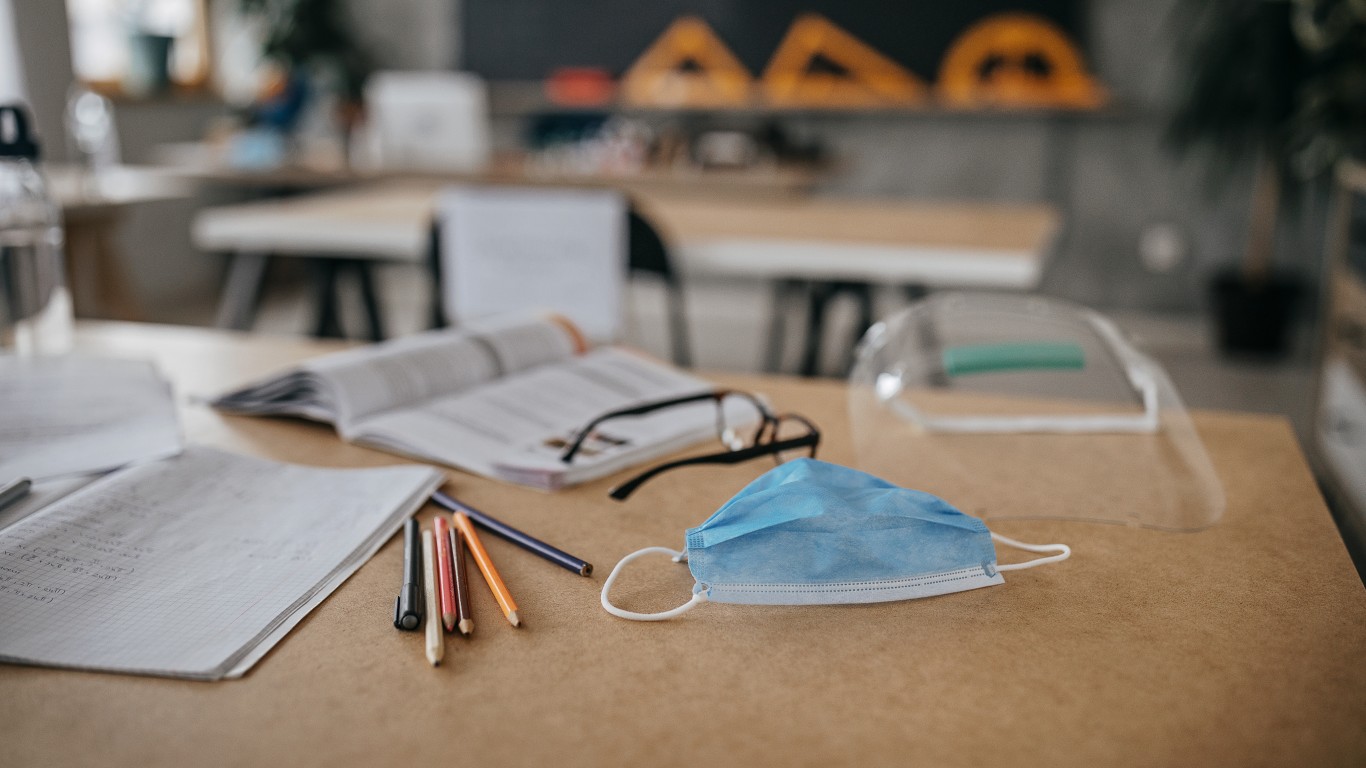
Wyoming
> Measures taken: Students don’t have to quarantine if, when exposed, both the infected student and close contacts were wearing face coverings.
> Health screening recommendations: Each school district to come up with its own safety measures
> COVID-19 cases as of Jan 20: 8,641 per 100,000 people — 17th highest (total: 49,922)
> Change avg. daily cases, Jan 12 – Jan 19: 3.8% — 13th smallest increase (from 48,072 to 49,922)
> Population: 578,000
Credit card companies are at war, handing out free rewards and benefits to win the best customers. A good cash back card can be worth thousands of dollars a year in free money, not to mention other perks like travel, insurance, and access to fancy lounges. See our top picks for the best credit cards today. You won’t want to miss some of these offers.
Flywheel Publishing has partnered with CardRatings for our coverage of credit card products. Flywheel Publishing and CardRatings may receive a commission from card issuers.
Thank you for reading! Have some feedback for us?
Contact the 24/7 Wall St. editorial team.